In this inaugural piece in our new Hispanic Studies series for Global Voices—“Spotlight on Alumni Careers and the Hispanic Studies Major”, we profile five of our alumni from graduating classes spanning an almost two decade period. All alumni are either practicing medical doctors, medical school students, or W&M graduates accepted into med school. All share reflections about the relevance and significance of their education and training as Hispanic Studies major, in terms of preparation for medical school and the practice of medicine more generally.
Philip Grotz
William & Mary Class of 2020
UVA School of Medicine Class of 2024
 Being a pre-med, I was often asked why I was so masochistic to take up a major in Hispanic Studies on top of my primary major in Neuroscience. In truth, my time in Hispanic Studies was anything but painful. Rather, I feel like all of my best college experiences came as a result of my involvement in the Hispanic Studies program, from studying jazz-flamenco music while abroad in Cádiz, Spain, to working as a medical interpreter on the Eastern Shore of Virginia. To me, pursuing this degree was never a distraction from my pre-med studies, but rather a unique way to pursue my interests that I believe made me a much stronger medical school applicant than I would have been otherwise. The type of student that med schools look for is exactly what my Hispanic Studies education helped me to become: a student who is unique and will contribute to community diversity, who understands the issues impacting inequality of care, and who has compassion for all people. When I worked as a Spanish-speaking medical interpreter, it was important to understand the systemic problems preventing non-English speakers from receiving healthcare in order to be an advocate for those patients when the system treats them unfairly.
Being a pre-med, I was often asked why I was so masochistic to take up a major in Hispanic Studies on top of my primary major in Neuroscience. In truth, my time in Hispanic Studies was anything but painful. Rather, I feel like all of my best college experiences came as a result of my involvement in the Hispanic Studies program, from studying jazz-flamenco music while abroad in Cádiz, Spain, to working as a medical interpreter on the Eastern Shore of Virginia. To me, pursuing this degree was never a distraction from my pre-med studies, but rather a unique way to pursue my interests that I believe made me a much stronger medical school applicant than I would have been otherwise. The type of student that med schools look for is exactly what my Hispanic Studies education helped me to become: a student who is unique and will contribute to community diversity, who understands the issues impacting inequality of care, and who has compassion for all people. When I worked as a Spanish-speaking medical interpreter, it was important to understand the systemic problems preventing non-English speakers from receiving healthcare in order to be an advocate for those patients when the system treats them unfairly.
In general, I feel like I gained a significant amount of confidence as this course of study made me come to terms with new situations. These include taking solo trips to jazz performances while studying abroad, thinking on my feet to communicate with individuals who spoke unfamiliar dialects while I was interpreting, and most recently, travelling to Cuba just out of my own personal interest. I cannot imagine what my education would have been like without this degree. Everything I learned from my Neuroscience major I will eventually be taught again, but the way that Hispanic Studies has introduced me to other perspectives, improved my interpersonal skills, and strengthened my moral convictions will never be replaced. Granted, my double-major might have made me a little busier than I would have been otherwise, but I’m sure it only served to better prepare me for the *actually* busy times, which are yet to come.
Maren Leibowitz, MD
William &Mary Class of 2015
University of Virginia School of Medicine Class of 2019
Emergency Medicine Resident at Northwestern Memorial Hospital in Chicago, IL
 It has never been more apparent how crucial my major in Hispanic Studies has been to my development as a doctor than during the 2020 COVID-9 pandemic. As an emergency medicine resident physician training in downtown Chicago, I interact with Spanish-speaking patients and their families every day. In non-pandemic times, navigating fears and complex medical situations in English is hard; navigating those same thoughts and feelings in Spanish is even harder. Add in the uncertainty of a pandemic when family members are not allowed to accompany their loved ones into the hospital, the task seems almost impossible. My Hispanic Studies classes and experiences at William & Mary gave me the confidence to speak Spanish knowing that I am understood by my patients and equipped me with the knowledge and tools to practice culturally humble and sensitive medicine. I am also a firm believer that having a broad set of interests leads to a more balanced physician. With my Hispanic Studies background, I sought out opportunities in medical school to get involved with my local Latino community and currently am working on building culturally relevant education platforms for training physicians. Who I am becoming as a doctor is in large part due to my choice to pursue a Hispanic Studies major at W&M. It has provided me much needed skills and perspectives that I am thankful to have every day I step into the hospital.
It has never been more apparent how crucial my major in Hispanic Studies has been to my development as a doctor than during the 2020 COVID-9 pandemic. As an emergency medicine resident physician training in downtown Chicago, I interact with Spanish-speaking patients and their families every day. In non-pandemic times, navigating fears and complex medical situations in English is hard; navigating those same thoughts and feelings in Spanish is even harder. Add in the uncertainty of a pandemic when family members are not allowed to accompany their loved ones into the hospital, the task seems almost impossible. My Hispanic Studies classes and experiences at William & Mary gave me the confidence to speak Spanish knowing that I am understood by my patients and equipped me with the knowledge and tools to practice culturally humble and sensitive medicine. I am also a firm believer that having a broad set of interests leads to a more balanced physician. With my Hispanic Studies background, I sought out opportunities in medical school to get involved with my local Latino community and currently am working on building culturally relevant education platforms for training physicians. Who I am becoming as a doctor is in large part due to my choice to pursue a Hispanic Studies major at W&M. It has provided me much needed skills and perspectives that I am thankful to have every day I step into the hospital.
Ethan Pearlstein, MD
William and Mary Class of 2015
Robert Wood Johnson Medical School Rutgers University, Class of 2019, with Distinction in Global Health
Resident Physician, Internal Medicine, Brown University in Providence, RI
 Often, college students interested in pursuing a career in medicine are advised and feel compelled to pursue an academic major in the sciences in preparation for medical school. While completion of all necessary pre-medical requirements is essential, in our increasingly diverse society, a Hispanic Studies degree educates students in cultural competencies and Spanish fluency. Such training prepares extremely strong medical school applicants. In a sea of applications from chemistry and biology majors, I feel that my Hispanic Studies background and senior honors thesis on the political abuse of psychiatry in Spain set me apart. On medical school and residency interviews, my Hispanic Studies research and fluency in Spanish were the focus of conversation. The fact that I did not major in the sciences was never even discussed. The pre-medical requirements at William and Mary provided me with a strong foundation to succeed in medical school without the need for a science major.
Often, college students interested in pursuing a career in medicine are advised and feel compelled to pursue an academic major in the sciences in preparation for medical school. While completion of all necessary pre-medical requirements is essential, in our increasingly diverse society, a Hispanic Studies degree educates students in cultural competencies and Spanish fluency. Such training prepares extremely strong medical school applicants. In a sea of applications from chemistry and biology majors, I feel that my Hispanic Studies background and senior honors thesis on the political abuse of psychiatry in Spain set me apart. On medical school and residency interviews, my Hispanic Studies research and fluency in Spanish were the focus of conversation. The fact that I did not major in the sciences was never even discussed. The pre-medical requirements at William and Mary provided me with a strong foundation to succeed in medical school without the need for a science major.
On the hospital floors in medical school and residency, I was actively sought out by my supervising physicians to interpret for Spanish speaking patients, or to help them better understand the cultural practices of our diverse patient population. While in medical school, I was able to take part in a local free clinic for the underserved and volunteered as both a Spanish interpreter and student doctor for our patients. Often, medical students and fellow residents express to me their regret that they did not seriously consider a major in foreign language. Simply put, my decision to pursue a major in Hispanic Studies is among my best career decisions to date. It certainly gave me an edge when applying for medical school and residency, offering a skillset to these programs that many other students and residents do not have. It allows me to communicate on a daily basis with an entire patient population in their native tongue, helping to alleviate their concerns related to language barriers and picking up cues that are often lost in translation. I am indebted to the Hispanic Studies program at William and Mary, and urge all pre-medical students to strongly consider a major in Hispanic Studies, if interested.
Jennifer Primegga, MD
William &Mary Class of 2002
Eastern Virginia Medical School Class of 2006
Infectious Disease Physician, Virginia Hospital Center
 As an infectious disease physician at a suburban hospital near Washington DC, I apply the skills I learned from my Hispanic Studies degree on a daily basis. I recently met a 58-year-old Spanish speaking male named MGL. He presented with months of progressive back pain. He was scared and his daughters were worried. He did not like to see doctors and had received no formal medical care in years. MRI of the lumbar spine revealed osteomyelitis, discitis and an epidural abscess. An echocardiogram of the heart showed endocarditis and a brain MRI showed multiple brain abscess. Usually with such severe infection, patients present with fevers, yet he did not. I was able to speak with him directly in Spanish (rather than through an interpreter phone) and gain his trust. He revealed that he had self-medicated with various antibiotics purchased without a prescription at a local “Tienda Latina.” His antibiotic use masked a classic presentation of his symptoms, which led to a delay in diagnosis. After multiple surgeries and weeks of antibiotics, he improved. I have continued to care for him over the last few months and have workeded with his daughters to coordinate all aspects of his care, from intravenous antibiotics, to follow-up imaging, to compliance with medical therapy. Direct communication and “cultural competency” were important in caring for this patient.
As an infectious disease physician at a suburban hospital near Washington DC, I apply the skills I learned from my Hispanic Studies degree on a daily basis. I recently met a 58-year-old Spanish speaking male named MGL. He presented with months of progressive back pain. He was scared and his daughters were worried. He did not like to see doctors and had received no formal medical care in years. MRI of the lumbar spine revealed osteomyelitis, discitis and an epidural abscess. An echocardiogram of the heart showed endocarditis and a brain MRI showed multiple brain abscess. Usually with such severe infection, patients present with fevers, yet he did not. I was able to speak with him directly in Spanish (rather than through an interpreter phone) and gain his trust. He revealed that he had self-medicated with various antibiotics purchased without a prescription at a local “Tienda Latina.” His antibiotic use masked a classic presentation of his symptoms, which led to a delay in diagnosis. After multiple surgeries and weeks of antibiotics, he improved. I have continued to care for him over the last few months and have workeded with his daughters to coordinate all aspects of his care, from intravenous antibiotics, to follow-up imaging, to compliance with medical therapy. Direct communication and “cultural competency” were important in caring for this patient.
Today, I diagnose and manage many infectious diseases commonly encountered in the Latino communities in the United States. Understanding cultural practices is key to understanding risk factors for disease. Latin America has high rates of tuberculosis. Consumption of food contaminated with pork tape worm leads to neurocysticercosis, the most common cause of seizures in Latino immigrants. Many Latinos are accustomed to self-treating because most pharmaceuticals are available without a prescription in their home countries. The overuse and misuse of antibiotics has led to exceedingly high rates of multidrug resistant bacterial infection in this population. Most recently though, the majority of the patients I see have novel coronavirus, which has disproportionally affected the Hispanic population. My hospital typically sees a population that is 20% Hispanic, but now 60% of our patients are Hispanic. Though we have telephone translation services, it is difficult for patients to hear translators over the loud sounds of oxygen needed to keep them alive. I am able to speak with these patients in person, manage their disease and assuage their concerns. I am grateful for my training, which has prepared me for this pandemic.
I knew from an early age that I wanted to become a doctor. To devote my life to the practice of medicine was to devote myself to a career of public service. Projections of the population I would encounter reflected a changing demographic. By 2050, 30% of the United States population is predicted to be Hispanic. To best serve the public, I needed to arm myself with the best tools; therefore, I chose to double major in Biology and Hispanic Studies. This decision has prepared me well for the medicine that I practice today.
Morgan Sehdev
William & Mary Class of 2017
Harvard Medical School Class of 2021
MD Candidate
 In early 2000 the medical school accreditation board of the Association of American Medical Colleges (AAMC) introduced two new standards for teaching cultural competency in medical education–the first time this requirement had entered the realm of medical teaching. In 2015, the AAMC modified the Medical College Admission Test (MCAT) to include questions on sociology and psychology in addition to the standard biology, chemistry and physics. Undergraduate pre-med requirements were also changed to reflect this new portion of the MCAT. While medical education has only recognized the need to include the social sciences and humanities over the past twenty years, medicine, since its inception, has and always will be a unique blend of the natural sciences, social sciences, and humanities.
In early 2000 the medical school accreditation board of the Association of American Medical Colleges (AAMC) introduced two new standards for teaching cultural competency in medical education–the first time this requirement had entered the realm of medical teaching. In 2015, the AAMC modified the Medical College Admission Test (MCAT) to include questions on sociology and psychology in addition to the standard biology, chemistry and physics. Undergraduate pre-med requirements were also changed to reflect this new portion of the MCAT. While medical education has only recognized the need to include the social sciences and humanities over the past twenty years, medicine, since its inception, has and always will be a unique blend of the natural sciences, social sciences, and humanities.
Over the past three years at medical school, I have been extremely grateful for the education I received as a Hispanic Studies major. In medicine, I found that knowing the science and the physiology is only half of the task we are asked to do. The other half includes communicating with patients, perceiving the way in which the patient’s social situation or place within society may be impacting their diagnosis, and recognizing cultural and structural factors that may be at play during any interaction. As a Hispanic Studies major proficiency within the social sciences and humanities was expected at the time of graduation, as there existed endless opportunities to hone verbal and written communication skills, critical thinking strategies, theory driven cultural or social analyses, and language acquisition abilities. Before you question this last one’s importance, think about “medicalese”, a whole new language that each medical student must learn upon entering the field! Medicine is both a science and an art. During the fast-paced nature of medical training, there’s very little time to appreciate that art if you haven’t already developed the skills to do so. The skills to appreciate the art of medicine can certainly be acquired through a cultural studies major prior to medical school.
To close, I’d love to point out an experience I would have never had without pursuing the Hispanic Studies major. I had the opportunity to learn about medical interpretation and later use it on the Eastern Shore of Virginia as an interpreter and outreach worker for migrant farmworkers. First, working as a part of the medical team was more valuable than any physician “shadowing” experience prior to medical school. Nightly visits to the camps gave me a more nuanced appreciation for the diagnoses I would later see in the clinic, both then and now, as I still think back to that experience. The farmworkers, through an ancillary project I was conducting, also taught me that, in their opinion, what makes us human is our ability to respect others as human beings. Knowing that I myself may have answered with a colder, potentially more scientific response that perhaps focused on cognition, I was struck by the simplicity and eloquence of the farmworkers’ answers. In medicine, there will always be times that lack clarity; in such moments I have thought back to those responses I heard. Reminding myself that respecting others is what makes us human helps me find my own clarity in such circumstances. Many other majors cannot provide students with a lens to view their future medical practice in quite the same way that Hispanic Studies does.  That lens is why I am always confident that I made the best possible decision for a major during my undergraduate studies. My Hispanic Studies major also gave me some of my best friends, the kind who drive all the way up to Boston to celebrate your White Coat Ceremony!
That lens is why I am always confident that I made the best possible decision for a major during my undergraduate studies. My Hispanic Studies major also gave me some of my best friends, the kind who drive all the way up to Boston to celebrate your White Coat Ceremony!
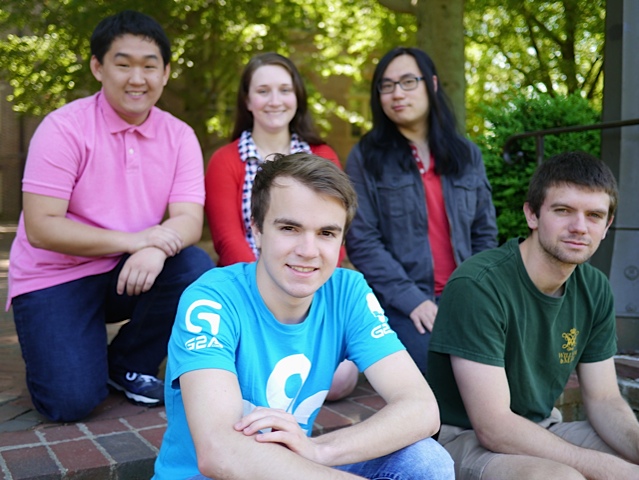

 Congratulations to the Graduating Class of 2015! From the left, Lisa Laird (German Studies and European Studies), Mike Crumplar, Helene Melke, and Tyler Bembenek (German Studies and IR).
Congratulations to the Graduating Class of 2015! From the left, Lisa Laird (German Studies and European Studies), Mike Crumplar, Helene Melke, and Tyler Bembenek (German Studies and IR).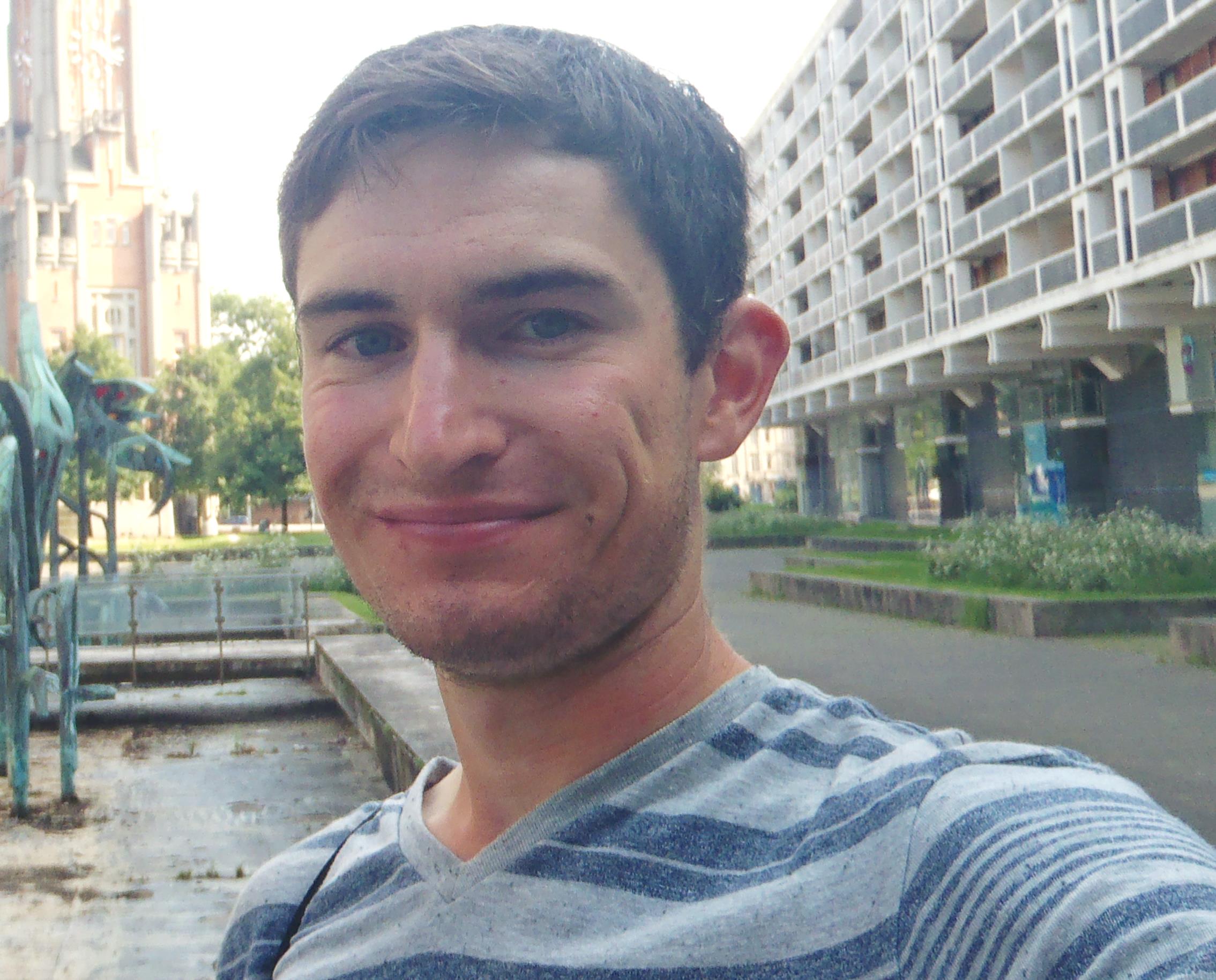
 The Modern Language Department at W&M is more than lectures and tenure – it is a center for sharing international languages and cultures with many diverse channels. Without the language programs, there would be no language houses, no friendly tutors, no immersion study abroad trips, fewer on campus celebrations of international festivals, and, most importantly, no motivated and caring professors who calmly correct our fautes de grammaire and errores ortográficos and push us to higher levels of engagement with texts, films, research, and critical analysis. I am also thankful for the collaborative skills that are taught in the modern language department through group classwork and projects, and it is exciting to see interlingual teamwork between the separate language professors. While it is hard to say goodbye to our inspirational home, we will carry our newfound appreciation for world cultures and our wider understanding of language learning opportunities into the world.
The Modern Language Department at W&M is more than lectures and tenure – it is a center for sharing international languages and cultures with many diverse channels. Without the language programs, there would be no language houses, no friendly tutors, no immersion study abroad trips, fewer on campus celebrations of international festivals, and, most importantly, no motivated and caring professors who calmly correct our fautes de grammaire and errores ortográficos and push us to higher levels of engagement with texts, films, research, and critical analysis. I am also thankful for the collaborative skills that are taught in the modern language department through group classwork and projects, and it is exciting to see interlingual teamwork between the separate language professors. While it is hard to say goodbye to our inspirational home, we will carry our newfound appreciation for world cultures and our wider understanding of language learning opportunities into the world.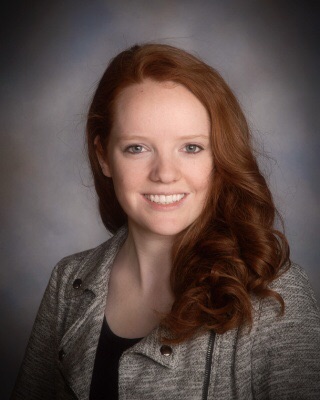
 Studying Chinese has taught me not only a new way of speaking, but a new way of thinking. Learning a language opens up a new world of people, cultures, and perspectives, and your own self-perception is forever changed. Being able to travel to China and speak an unfamiliar language in an unfamiliar environment was a reminder to me that the world is so much more than what I see on a day-to-day basis. I now feel that one can never fully understand their own society until they are an outsider in another. I am so thankful to all of my Chinese friends and teachers who have challenged me to see the world through a different lens and to never give up in pursuit of proficiency.
Studying Chinese has taught me not only a new way of speaking, but a new way of thinking. Learning a language opens up a new world of people, cultures, and perspectives, and your own self-perception is forever changed. Being able to travel to China and speak an unfamiliar language in an unfamiliar environment was a reminder to me that the world is so much more than what I see on a day-to-day basis. I now feel that one can never fully understand their own society until they are an outsider in another. I am so thankful to all of my Chinese friends and teachers who have challenged me to see the world through a different lens and to never give up in pursuit of proficiency.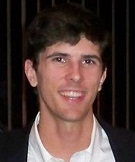
 As someone interested in working in foreign policy, studying language has formed a key part of my college curriculum. However, the utility of modern language studies is greater than just providing language proficiency. My courses in the German Studies department, as well as my one summer learning Farsi, have given me valuable insights into foreign societies. By studying the historical, cultural, and political contexts of these nations, I’ve gained a much broader perspective on current events and a greater comprehension of what life is like across the globe. This, in turn, has provided me with a more realistic and compassionate mindset, an asset which will pay dividends not only in my future career, but in the fundamental search for human connection. Although I still have much learning to do—we are, I hope, never truly done—my time spent studying language at William and Mary has been a valuable step in the right direction.
As someone interested in working in foreign policy, studying language has formed a key part of my college curriculum. However, the utility of modern language studies is greater than just providing language proficiency. My courses in the German Studies department, as well as my one summer learning Farsi, have given me valuable insights into foreign societies. By studying the historical, cultural, and political contexts of these nations, I’ve gained a much broader perspective on current events and a greater comprehension of what life is like across the globe. This, in turn, has provided me with a more realistic and compassionate mindset, an asset which will pay dividends not only in my future career, but in the fundamental search for human connection. Although I still have much learning to do—we are, I hope, never truly done—my time spent studying language at William and Mary has been a valuable step in the right direction.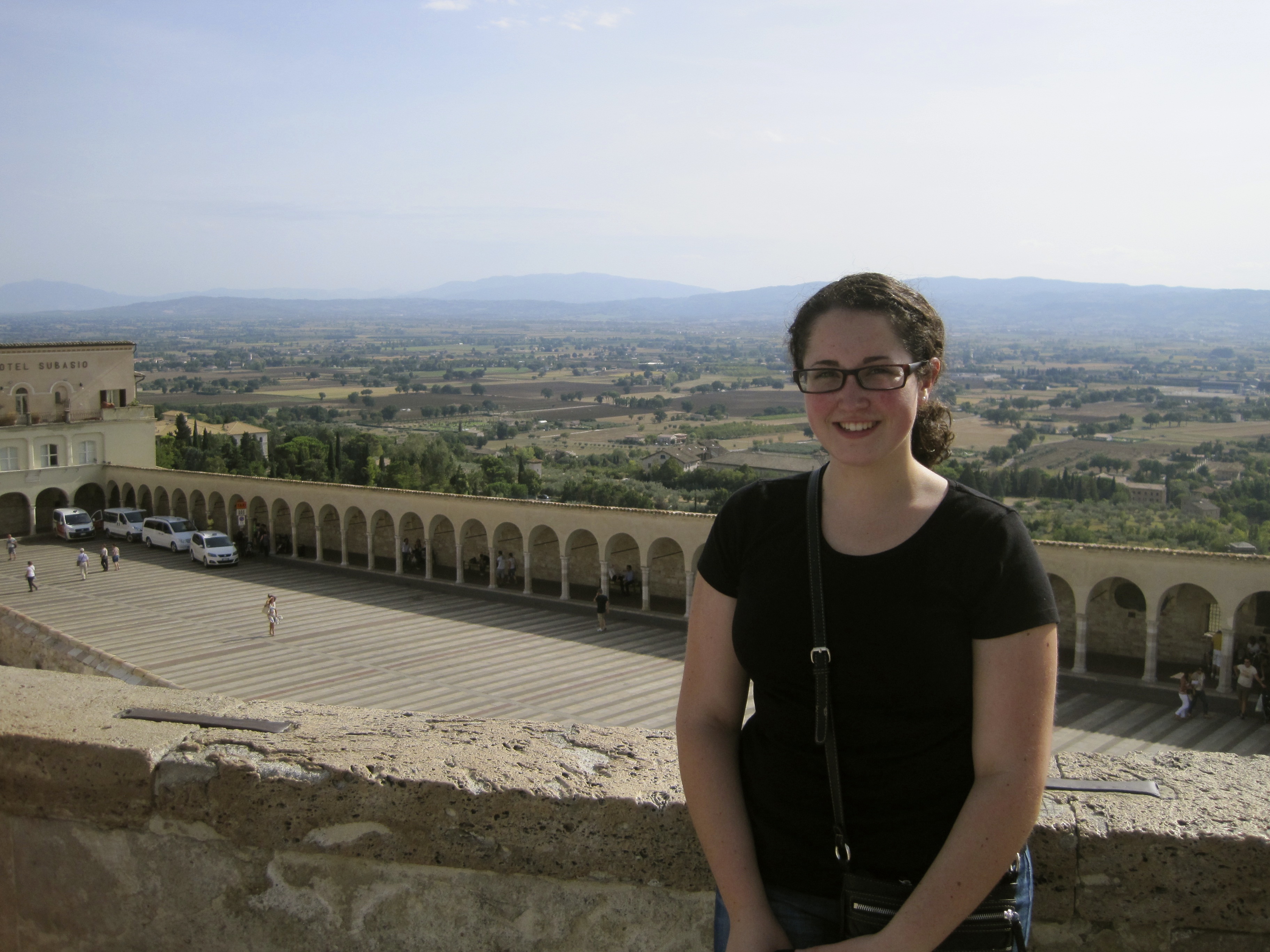
 My studies in MLL have permitted me to meet incredible people around the world and right here on campus. Taking language classes really creates a bond between people! From these friendships I have gained a more global perspective. One of my favorite things to do while studying abroad was to ask my friends their opinions on current events ranging from international affairs to pop culture. The people that I have met through my studies in MLL have helped me grow as an individual and widen my horizons. I believe that studying Italian is more than learning grammar and vocabulary. Instead, it is a gateway to understanding a foreign culture, new perspectives, and yourself. The skills and perspectives that I have garnered during my time in the department will without doubt help me succeed in my career.
My studies in MLL have permitted me to meet incredible people around the world and right here on campus. Taking language classes really creates a bond between people! From these friendships I have gained a more global perspective. One of my favorite things to do while studying abroad was to ask my friends their opinions on current events ranging from international affairs to pop culture. The people that I have met through my studies in MLL have helped me grow as an individual and widen my horizons. I believe that studying Italian is more than learning grammar and vocabulary. Instead, it is a gateway to understanding a foreign culture, new perspectives, and yourself. The skills and perspectives that I have garnered during my time in the department will without doubt help me succeed in my career.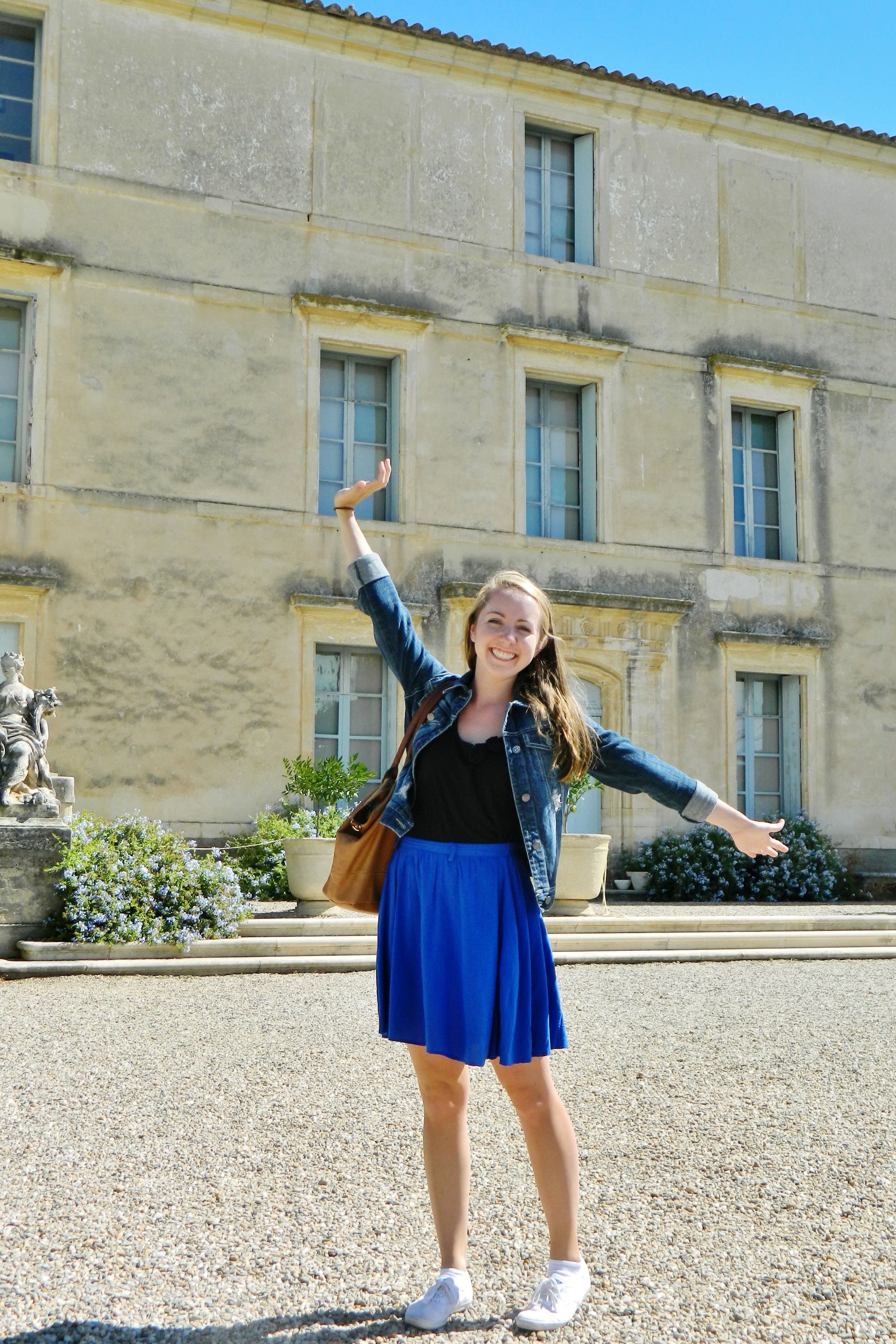
 My experiences in the Department of Modern Languages have been among the most formative of my college career. Over the past four years of French and German classes, I have, of course, had the opportunity to improve my language skills. But it has been so much more than that! As a French major, I have been able to study everything from the subversive literature of the Francophone Caribbean to the symbolism of the gardens at Versailles to the origins of the French nation (hint: its ancestors are not les gaulois). In addition to spending a semester abroad at the Université de Montpellier, I have had the opportunity to conduct honors thesis research in France (funded by a scholarship offered through the French Department) and to serve as a tutor and teaching assistant, an experience which inspired me to apply for the Fulbright English Teaching Assistantship Program in Luxembourg.
My experiences in the Department of Modern Languages have been among the most formative of my college career. Over the past four years of French and German classes, I have, of course, had the opportunity to improve my language skills. But it has been so much more than that! As a French major, I have been able to study everything from the subversive literature of the Francophone Caribbean to the symbolism of the gardens at Versailles to the origins of the French nation (hint: its ancestors are not les gaulois). In addition to spending a semester abroad at the Université de Montpellier, I have had the opportunity to conduct honors thesis research in France (funded by a scholarship offered through the French Department) and to serve as a tutor and teaching assistant, an experience which inspired me to apply for the Fulbright English Teaching Assistantship Program in Luxembourg.
 When I arrived at William & Mary, I thought my language studies were done. I’d studied French all throughout high school and had completed the language requirement for my major, so I was surprised when, during Spring Registration, I found myself looking at classes in the Modern Language department. My studies in MLL transformed my college experience. “Just a couple classes” turned into “maybe just one summer program” to “how about a minor” to “well, why not just double major.” In taking French classes I got the opportunity to study literature, politics, culture and, of course, language, providing me with a vast array of knowledge that can hardly be expressed by saying “I’m a French major.” I’ve gained the ability to adapt, to interpret, and to analyze and I am confident that these skills will remain invaluable in whatever path I follow.
When I arrived at William & Mary, I thought my language studies were done. I’d studied French all throughout high school and had completed the language requirement for my major, so I was surprised when, during Spring Registration, I found myself looking at classes in the Modern Language department. My studies in MLL transformed my college experience. “Just a couple classes” turned into “maybe just one summer program” to “how about a minor” to “well, why not just double major.” In taking French classes I got the opportunity to study literature, politics, culture and, of course, language, providing me with a vast array of knowledge that can hardly be expressed by saying “I’m a French major.” I’ve gained the ability to adapt, to interpret, and to analyze and I am confident that these skills will remain invaluable in whatever path I follow.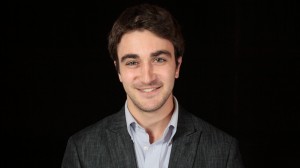
 The MLL was extremely encouraging and supportive of my endeavors to explore my interests and to realize my dreams. The faculty in the Chinese program in particular and in the MLL department in general was instrumental in helping me to intern in China for two summers, study abroad in Spain for a semester, and conduct research in Beijing for my Honors Thesis. With the continuous help of my dynamic thesis adviser, Assistant Professor of Chinese Studies Calvin Hui, I was able to conduct research for my honors thesis on a topic that involves both my personal and academic interest while on a fully funded Honors Fellowship.
The MLL was extremely encouraging and supportive of my endeavors to explore my interests and to realize my dreams. The faculty in the Chinese program in particular and in the MLL department in general was instrumental in helping me to intern in China for two summers, study abroad in Spain for a semester, and conduct research in Beijing for my Honors Thesis. With the continuous help of my dynamic thesis adviser, Assistant Professor of Chinese Studies Calvin Hui, I was able to conduct research for my honors thesis on a topic that involves both my personal and academic interest while on a fully funded Honors Fellowship.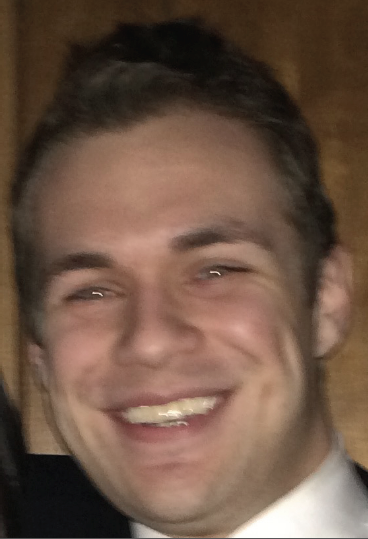
 Being a Chinese major in the Modern Languages and Literatures program has helped globalize and diversify my college experience as well as supplement my Finance major. Through studying Chinese language and literature, reading about Chinese culture, and traveling to China, I have gained a broader perspective on every aspect on my life. Being a part of the MLL program has not only shaped who I am as a scholar, but who I am as a person.
Being a Chinese major in the Modern Languages and Literatures program has helped globalize and diversify my college experience as well as supplement my Finance major. Through studying Chinese language and literature, reading about Chinese culture, and traveling to China, I have gained a broader perspective on every aspect on my life. Being a part of the MLL program has not only shaped who I am as a scholar, but who I am as a person.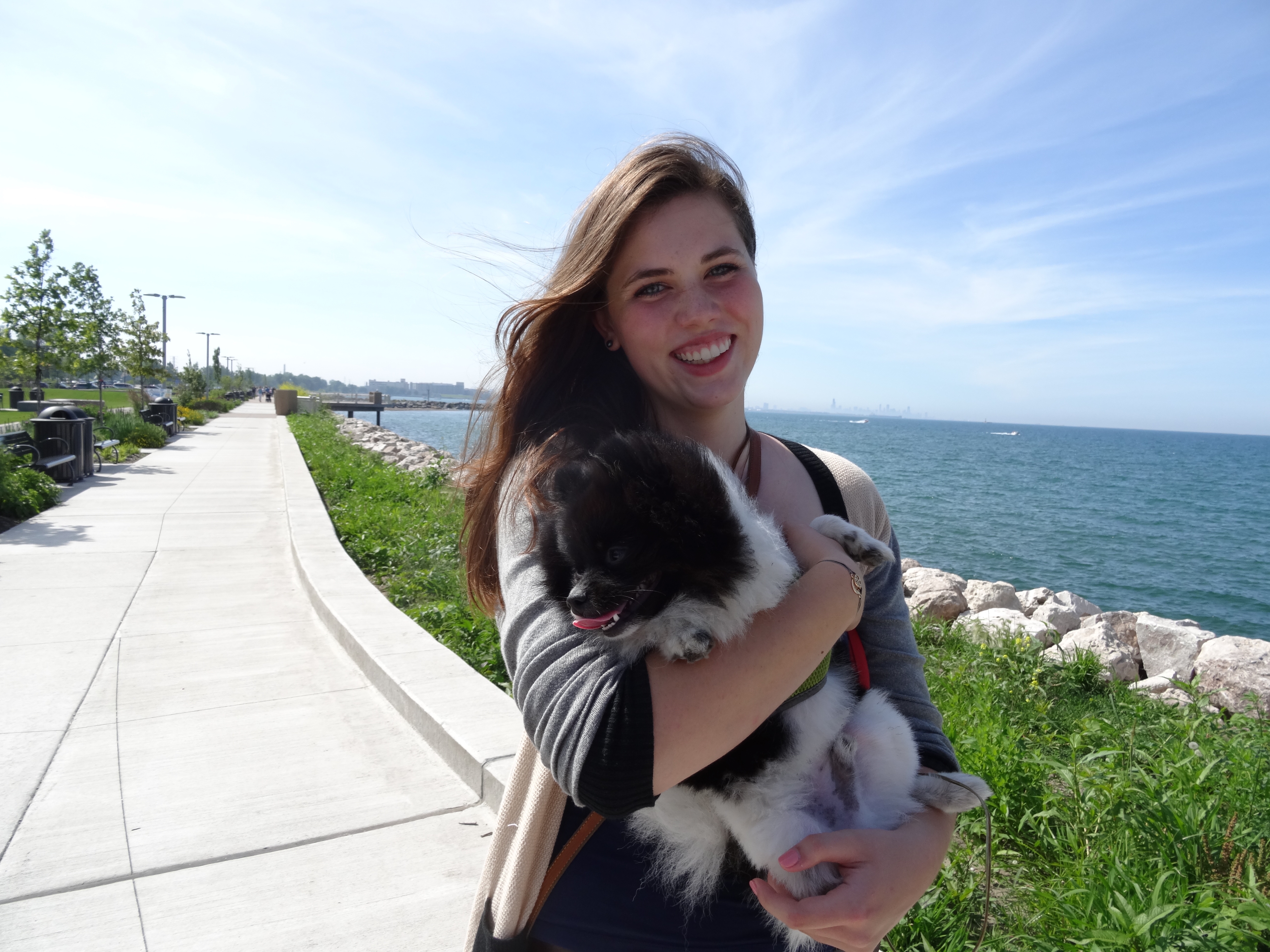
 Studying French has given me a great schema for problem solving. Even if my jobs in future don’t specifically call for foreign language skills, the transferable skills I’ve gained from French will serve me my whole life.
Studying French has given me a great schema for problem solving. Even if my jobs in future don’t specifically call for foreign language skills, the transferable skills I’ve gained from French will serve me my whole life.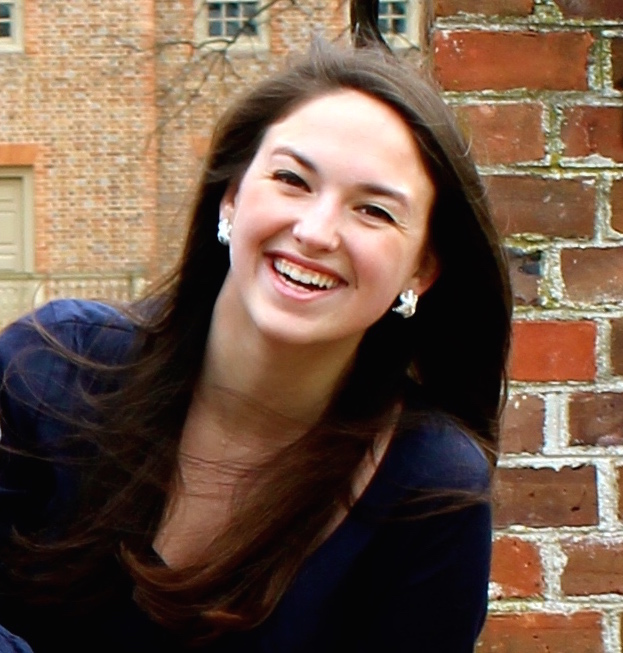
 My studies in MLL gave me the opportunity to study abroad in Montpellier, and allowed me to experience the language and culture in a way that could never be captured in the classroom. It opened my mind to the experiences and cultures of others. It empowered me when I was able to communicate with others to explore new interests both academic and leisure. My language and my study abroad experience has sparked my passion for traveling, and I hope to one day continue this passion to explore the other cultures that make up the Francophone world.
My studies in MLL gave me the opportunity to study abroad in Montpellier, and allowed me to experience the language and culture in a way that could never be captured in the classroom. It opened my mind to the experiences and cultures of others. It empowered me when I was able to communicate with others to explore new interests both academic and leisure. My language and my study abroad experience has sparked my passion for traveling, and I hope to one day continue this passion to explore the other cultures that make up the Francophone world. What is perhaps most exciting and stimulating about German Studies is its interdisciplinary. It isn’t limited to a single field or aspect of history, philosophy, literature, art, and so on. Rather, it is a door to a series of conversations on all these categories in a language that has its own fundamental ontological quality, and the speakers in these conversations include some of the most brilliant minds of all time. While its not always necessary to be able to understand many of the ideas and read texts in translation, an understanding of the German language allows one to participate in these conversations and engage with the texts at a more meaningful level. In this sense, German Studies is a perfect major for someone who can’t decide one single area of study because so many are interesting, and wants to come out of school having learned a foreign language, which is unfortunately something that too few Americans do.
What is perhaps most exciting and stimulating about German Studies is its interdisciplinary. It isn’t limited to a single field or aspect of history, philosophy, literature, art, and so on. Rather, it is a door to a series of conversations on all these categories in a language that has its own fundamental ontological quality, and the speakers in these conversations include some of the most brilliant minds of all time. While its not always necessary to be able to understand many of the ideas and read texts in translation, an understanding of the German language allows one to participate in these conversations and engage with the texts at a more meaningful level. In this sense, German Studies is a perfect major for someone who can’t decide one single area of study because so many are interesting, and wants to come out of school having learned a foreign language, which is unfortunately something that too few Americans do.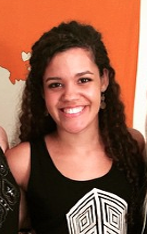
 I am so thankful that I am a French major at the College of William & Mary. French language has been a part of my life since I was young. I fell in love with the language then and could never imagine not sticking with it after that!
I am so thankful that I am a French major at the College of William & Mary. French language has been a part of my life since I was young. I fell in love with the language then and could never imagine not sticking with it after that!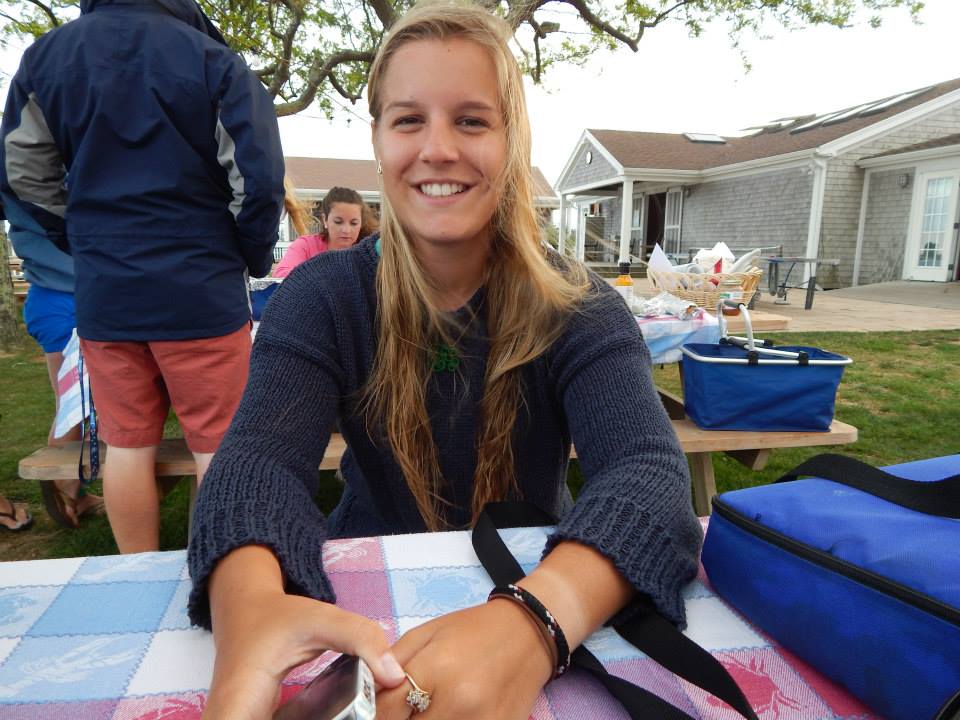

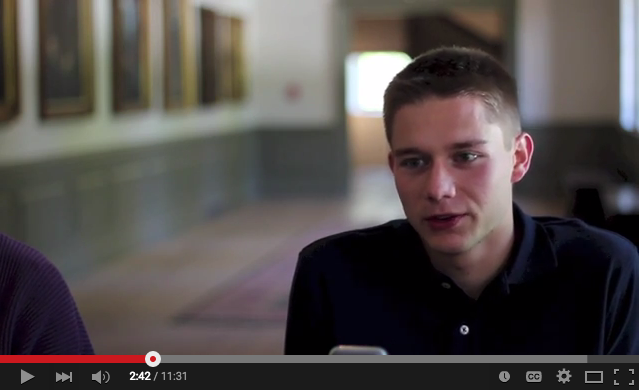
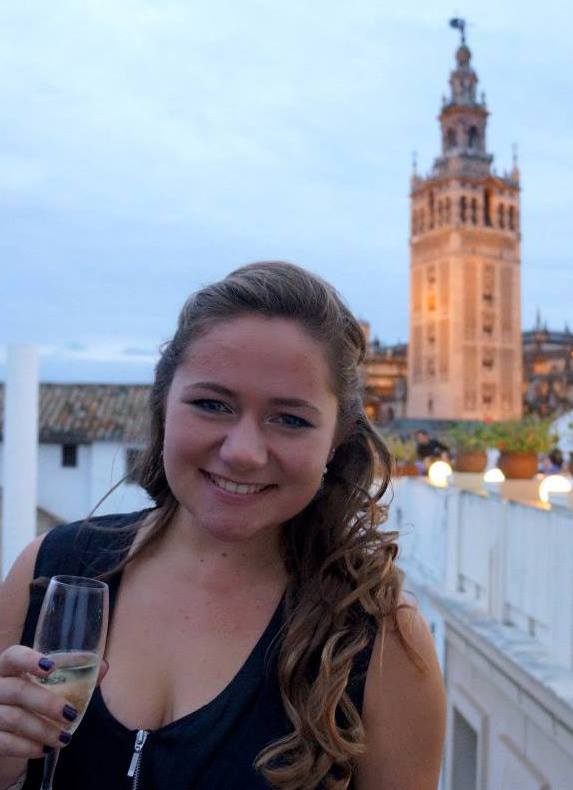
 I had always loved learning Spanish in high school, but I never dreamed that it would have such an important role in my undergraduate education and in my life. After studying abroad in Sevilla, Spain my sophomore year, I discovered how a language could unlock a culture and a people that came to mean so much to me. This transformative experienced influenced the rest of my college career, causing me to pursue a major and to incorporate the Spanish language as a part of my identity and future dreams. The Hispanic Studies program has inspired me to challenge my preconceived notions of the world, to constantly question, and never stop discovering.
I had always loved learning Spanish in high school, but I never dreamed that it would have such an important role in my undergraduate education and in my life. After studying abroad in Sevilla, Spain my sophomore year, I discovered how a language could unlock a culture and a people that came to mean so much to me. This transformative experienced influenced the rest of my college career, causing me to pursue a major and to incorporate the Spanish language as a part of my identity and future dreams. The Hispanic Studies program has inspired me to challenge my preconceived notions of the world, to constantly question, and never stop discovering. My decision to major in Hispanic was a bit accidental, but whole-hearted. I began solely as a Linguistics major when I went to Seville to study abroad my sophomore year, but I was enchanted by the people, the language and especially the accent. I returned to Seville for a second semester the next year and continued to take Hispanic Studies courses on campus. My favorite aspect of the program is how the classes pushed me to grow in my conceptions of culture, politics, language, human rights, economy, literature… there’s really a well-rounded expansion of understanding that takes place. Now that I have a double degree in Linguistics and Hispanic Studies I plan to teach English in Spain for a year before continuing to graduate school.
My decision to major in Hispanic was a bit accidental, but whole-hearted. I began solely as a Linguistics major when I went to Seville to study abroad my sophomore year, but I was enchanted by the people, the language and especially the accent. I returned to Seville for a second semester the next year and continued to take Hispanic Studies courses on campus. My favorite aspect of the program is how the classes pushed me to grow in my conceptions of culture, politics, language, human rights, economy, literature… there’s really a well-rounded expansion of understanding that takes place. Now that I have a double degree in Linguistics and Hispanic Studies I plan to teach English in Spain for a year before continuing to graduate school.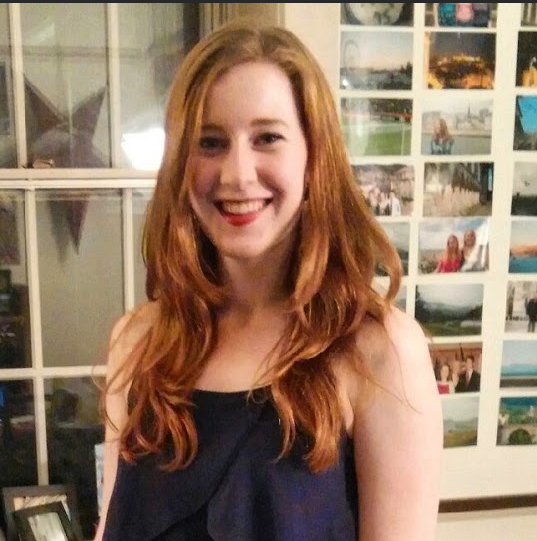
 After studying Russian & Post-Soviet Studies at the College, I have been exposed to many more schools of thought and ways of thinking about the world than I could have imagined just four short years ago. Through the Russian program’s emphasis on film and literature, I have come to realize how much weight cultural texts hold and how they can not only reflect a culture, but help shape it. Now, I don’t know if I’ll go on to be a great Russian literary analyst or film critic, but my education here has helped me to develop my understanding of people and identity, which is what I’ll take with me into my future. Whether that is transferred into teaching, serving in the Foreign Service, working with international NGOs, or a combination of everything, I know that my time here, what I’ve learned, and the people I’ve met will stay with me.
After studying Russian & Post-Soviet Studies at the College, I have been exposed to many more schools of thought and ways of thinking about the world than I could have imagined just four short years ago. Through the Russian program’s emphasis on film and literature, I have come to realize how much weight cultural texts hold and how they can not only reflect a culture, but help shape it. Now, I don’t know if I’ll go on to be a great Russian literary analyst or film critic, but my education here has helped me to develop my understanding of people and identity, which is what I’ll take with me into my future. Whether that is transferred into teaching, serving in the Foreign Service, working with international NGOs, or a combination of everything, I know that my time here, what I’ve learned, and the people I’ve met will stay with me.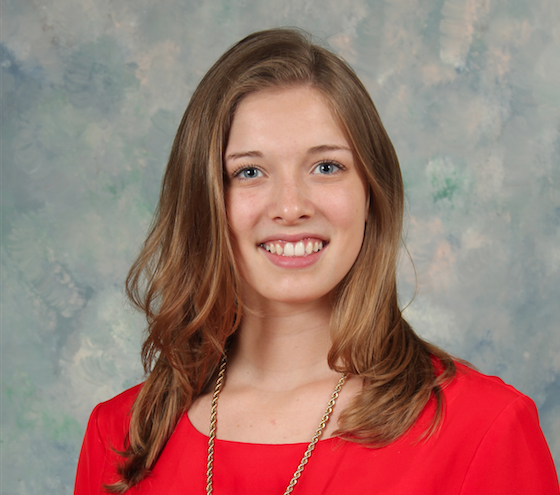

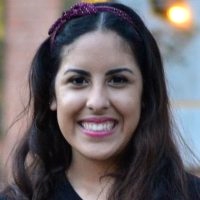
 My Italian minor shaped my college experience in ways I never imagined. I began taking courses my freshman year strictly to fulfill language requirements, but quickly fell in love with the language and culture. My sophomore year I spent a semester in Perugia, Italy, where I learned to break out of my comfort zone and make intelligent risks.
My Italian minor shaped my college experience in ways I never imagined. I began taking courses my freshman year strictly to fulfill language requirements, but quickly fell in love with the language and culture. My sophomore year I spent a semester in Perugia, Italy, where I learned to break out of my comfort zone and make intelligent risks. 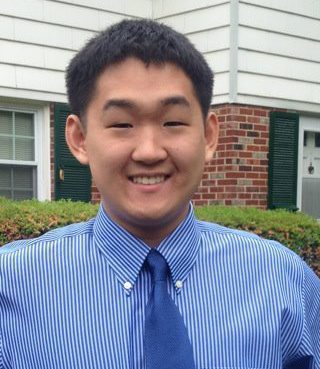
 My high school left me with a bad impression of the humanities. As a consequence, I spent my first two years here at William and Mary struggling to pursue a science major. Were it not for the classes I took with the Japanese department in my freshman year, there’s a good chance I would have dropped out of college altogether. Those classes which I originally took to fulfill GERs provided the most stimulating and challenging work I’ve ever done. My desire to learn more about the culture convinced me to pursue the AMES East Asian Studies major, a switch I only regret not making sooner. Now, I can appreciate culture in a way I never could before thanks to a newfound understanding of global history, analysis of cultural works, and ethnographic methodology. AMES and MLL helped me in ways I don’t think even my professors can understand. They’ve done more than just help direct me towards a field of study. They’ve taught me a new way to look at life.
My high school left me with a bad impression of the humanities. As a consequence, I spent my first two years here at William and Mary struggling to pursue a science major. Were it not for the classes I took with the Japanese department in my freshman year, there’s a good chance I would have dropped out of college altogether. Those classes which I originally took to fulfill GERs provided the most stimulating and challenging work I’ve ever done. My desire to learn more about the culture convinced me to pursue the AMES East Asian Studies major, a switch I only regret not making sooner. Now, I can appreciate culture in a way I never could before thanks to a newfound understanding of global history, analysis of cultural works, and ethnographic methodology. AMES and MLL helped me in ways I don’t think even my professors can understand. They’ve done more than just help direct me towards a field of study. They’ve taught me a new way to look at life.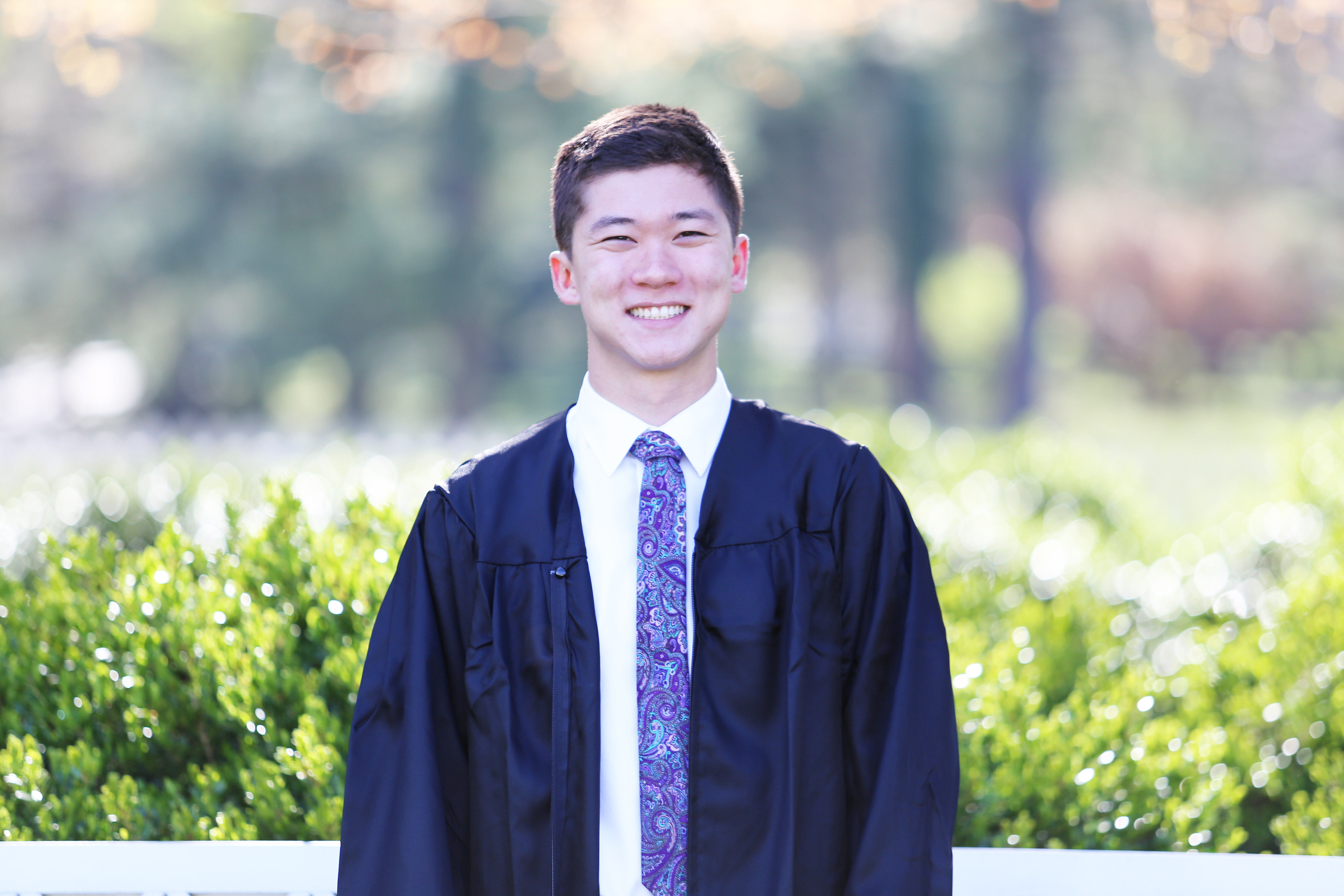
 After four months of studying abroad in Beijing, Catherine, Henry, Owen, Paula and I wanted to explore some of the vast country. When the five of us stepped off the plane at midnight in Guilin, China, rather than being focused on adventure, our exhausted minds only wanted to find the fastest way to get to our hostel’s bed. Well low and behold, our hostel, which was an hour away, had accidentally misbooked our ride. In exhausted, panicked, Chinese, we talked to the airport information desk, disappointedly learning that every immediate cab and hostel was unavailable. Fortunately, a Guilin local overheard our predicament and decided to give us all a ride. Putting our trust in this complete stranger we piled into his van and reached the hostel just shy of 2am. The next four days in Yangshuo proceeded to be what I consider the best experience of my time abroad.
After four months of studying abroad in Beijing, Catherine, Henry, Owen, Paula and I wanted to explore some of the vast country. When the five of us stepped off the plane at midnight in Guilin, China, rather than being focused on adventure, our exhausted minds only wanted to find the fastest way to get to our hostel’s bed. Well low and behold, our hostel, which was an hour away, had accidentally misbooked our ride. In exhausted, panicked, Chinese, we talked to the airport information desk, disappointedly learning that every immediate cab and hostel was unavailable. Fortunately, a Guilin local overheard our predicament and decided to give us all a ride. Putting our trust in this complete stranger we piled into his van and reached the hostel just shy of 2am. The next four days in Yangshuo proceeded to be what I consider the best experience of my time abroad.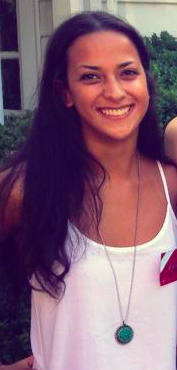
 My time in the MLL department at William and Mary has been some of the most enriching of my college experience. I’ve become close with my Italian classmates and professors in this sort of mini-community that has supported me and given me the courage to use Italian to explore the world, to explore my strengths and weaknesses, and to push myself out of my comfort zone – many, many times. The MLL department encouraged me to study abroad in Perugia, Italy, Professor Boyle mentored me as a TA, and helped me plan a return to Italy to study the current European immigration crisis in Turin. Using the Italian language to connect with people and understand their lives and challenges helped me to think about language as a way to bridge cultures and communities in ways that encourage peace. I hope to continue working in this vein after graduation during my time with the Pulitzer Center on Crisis Reporting.
My time in the MLL department at William and Mary has been some of the most enriching of my college experience. I’ve become close with my Italian classmates and professors in this sort of mini-community that has supported me and given me the courage to use Italian to explore the world, to explore my strengths and weaknesses, and to push myself out of my comfort zone – many, many times. The MLL department encouraged me to study abroad in Perugia, Italy, Professor Boyle mentored me as a TA, and helped me plan a return to Italy to study the current European immigration crisis in Turin. Using the Italian language to connect with people and understand their lives and challenges helped me to think about language as a way to bridge cultures and communities in ways that encourage peace. I hope to continue working in this vein after graduation during my time with the Pulitzer Center on Crisis Reporting.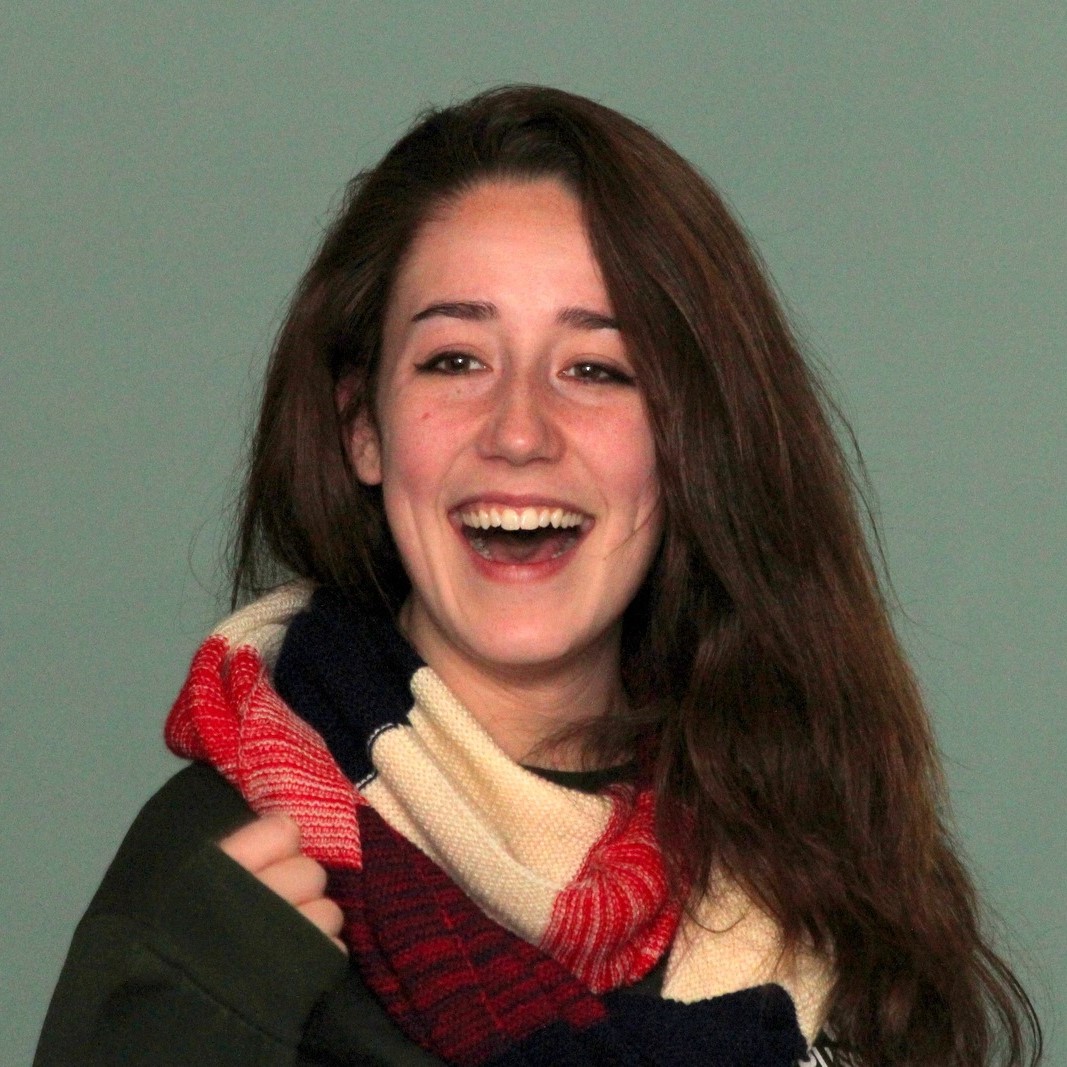
 I began my studies in the RPSS Department as a freshman on a whim. At that time, the only things I knew about Russia came from stories about my mother’s travels as a junior naval officer during the Cold War; I viewed Russia only as America’s past enemy and a curiosity. Since then I’ve learned through classes about Russian language, government, culture, art, and history, and with the St. Petersburg program I began to understand the essence of the Russian people and realize that my past perceptions of them were misinformed and unfair. These experiences significantly altered my values and priorities as an American student and citizen. They opened my eyes to the merits of incorporating diverse cultural perspectives into improving American systems and ideas, which, as I soon realized, are not as great as I originally thought they were. Consequently, I plan to continue developing a more globalized way of thinking by pursuing veterinary school outside the US for the next four years, something I’d never have thought to do four years ago.
I began my studies in the RPSS Department as a freshman on a whim. At that time, the only things I knew about Russia came from stories about my mother’s travels as a junior naval officer during the Cold War; I viewed Russia only as America’s past enemy and a curiosity. Since then I’ve learned through classes about Russian language, government, culture, art, and history, and with the St. Petersburg program I began to understand the essence of the Russian people and realize that my past perceptions of them were misinformed and unfair. These experiences significantly altered my values and priorities as an American student and citizen. They opened my eyes to the merits of incorporating diverse cultural perspectives into improving American systems and ideas, which, as I soon realized, are not as great as I originally thought they were. Consequently, I plan to continue developing a more globalized way of thinking by pursuing veterinary school outside the US for the next four years, something I’d never have thought to do four years ago.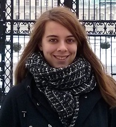
 The German Studies department was my first home at William & Mary. Walking in to meet my advisor was like coming up for air after the frenzy of freshman orientation. After four years of German in high school and a month in Aachen, I knew going in that I wanted to pursue a degree in German Studies. Unlike the new faces, the new hallways, and new room, German was comfortably familiar. That feeling, of course, did not last long. Like any good languages major, I dove straight into the deep end with a 300 level grammar and stylistics course, in addition to a writing intensive freshman seminar on the Berlin Wall. Surrounded by seasoned upperclassmen, I was, at first, afraid I had no business being there, but was quickly made included by the students and our professor.
The German Studies department was my first home at William & Mary. Walking in to meet my advisor was like coming up for air after the frenzy of freshman orientation. After four years of German in high school and a month in Aachen, I knew going in that I wanted to pursue a degree in German Studies. Unlike the new faces, the new hallways, and new room, German was comfortably familiar. That feeling, of course, did not last long. Like any good languages major, I dove straight into the deep end with a 300 level grammar and stylistics course, in addition to a writing intensive freshman seminar on the Berlin Wall. Surrounded by seasoned upperclassmen, I was, at first, afraid I had no business being there, but was quickly made included by the students and our professor.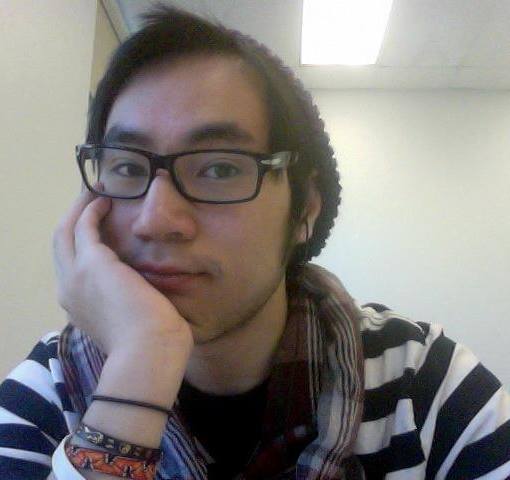
 Being a Vietnamese American born in New Orleans who jumped from French to Latin to Spanish and then eventually Japanese, I sometimes wonder if I could have majored in anything but Hispanic Studies with a minor in Japanese. What drew me to the programs was the heaps of cultural theory work that helped me make sense of the world around me, both on an academic level as well as a personal level. Anderson’s notions on self-fashioning and imagined communities; Haraway’s Cyborg Manifesto on the traps of identity politics; Altarriba’s defense of graphic novels as a medium of cultural trauma in El arte de volar; and Azuma’s theories on database consumption. The list goes on and on. Of course, a big part of the Hispanic Studies and Japanese Studies department are the professors, and I’ve been blessed to work with such wonderful and supportive people throughout my entire college career. Through their help, I was able to secure multiple internships, research opportunities, and eventually a TA position. Because of my linguistic and analytical skills gained from my Hispanic and Japanese Studies background, I was accepted into the JET Programme and will be teaching English in Japan for the next few years after graduation.
Being a Vietnamese American born in New Orleans who jumped from French to Latin to Spanish and then eventually Japanese, I sometimes wonder if I could have majored in anything but Hispanic Studies with a minor in Japanese. What drew me to the programs was the heaps of cultural theory work that helped me make sense of the world around me, both on an academic level as well as a personal level. Anderson’s notions on self-fashioning and imagined communities; Haraway’s Cyborg Manifesto on the traps of identity politics; Altarriba’s defense of graphic novels as a medium of cultural trauma in El arte de volar; and Azuma’s theories on database consumption. The list goes on and on. Of course, a big part of the Hispanic Studies and Japanese Studies department are the professors, and I’ve been blessed to work with such wonderful and supportive people throughout my entire college career. Through their help, I was able to secure multiple internships, research opportunities, and eventually a TA position. Because of my linguistic and analytical skills gained from my Hispanic and Japanese Studies background, I was accepted into the JET Programme and will be teaching English in Japan for the next few years after graduation.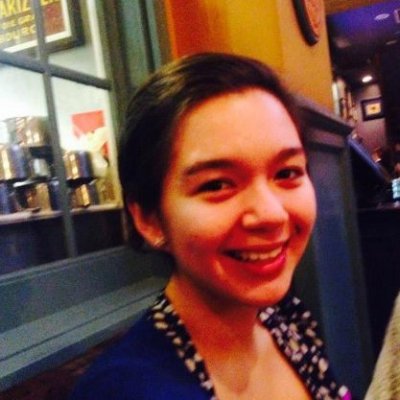
 I’ve always been one to look ahead. I’m always thinking about how the choices I make today can impact the person I’ll be in five, ten, fifteen years. Just four years ago I made one of the biggest decisions of my life: to study Chinese.
I’ve always been one to look ahead. I’m always thinking about how the choices I make today can impact the person I’ll be in five, ten, fifteen years. Just four years ago I made one of the biggest decisions of my life: to study Chinese.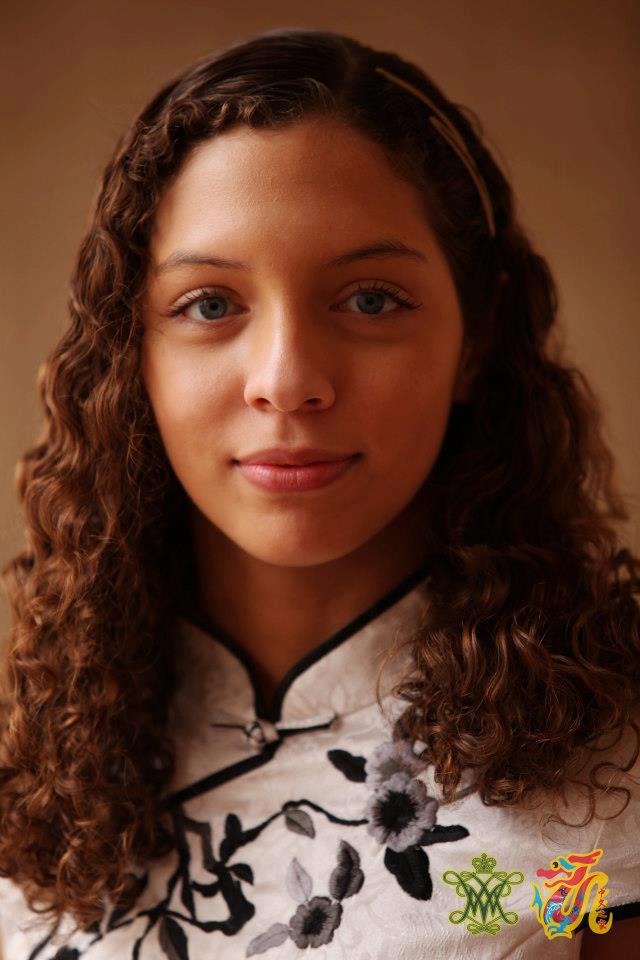
 I began studying Mandarin Chinese during my freshman year of high school, and since continuing into higher education I have only grown more and more fond of and fascinated by the language. During my study abroad in the summer of 2013 I experienced first hand the vibrancy of Beijing, the worldwide impacts of globalization, and the widening of cultural horizons that can only come from international travel. More than simply contrasting the differences between Chinese and American culture during my studies, I also learned how to see elements of each culture in the other, and subsequently more of myself in others who at first glance might seem very foreign. I’ve learned that although most have obvious differences, any two cultures are truly more alike than different, and that it is because of this that we should continue to promote intercultural acceptance and understanding, which includes the study of foreign language.
I began studying Mandarin Chinese during my freshman year of high school, and since continuing into higher education I have only grown more and more fond of and fascinated by the language. During my study abroad in the summer of 2013 I experienced first hand the vibrancy of Beijing, the worldwide impacts of globalization, and the widening of cultural horizons that can only come from international travel. More than simply contrasting the differences between Chinese and American culture during my studies, I also learned how to see elements of each culture in the other, and subsequently more of myself in others who at first glance might seem very foreign. I’ve learned that although most have obvious differences, any two cultures are truly more alike than different, and that it is because of this that we should continue to promote intercultural acceptance and understanding, which includes the study of foreign language.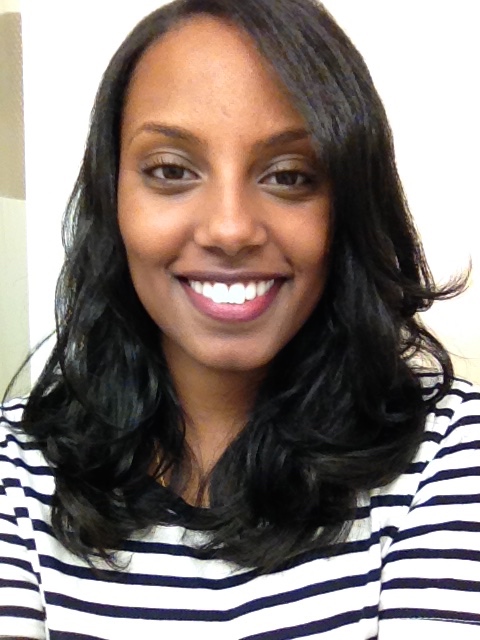
 Schon immer hat mich deutsche Literatur, Philosophie und Geschichte interessiert. Auf dem Gymnasium haben wir oft nur Themen wie Bismarck oder die Weltkriege besprochen, und das auch nur oberflächlich. Ich hatte oftmals das Gefühl, dass wir nur die ‘wichtigsten’ oder ‘bekanntesten’ Geschehnisse behandelten, aber nie Fragen gestellt hatten, wie diese überhaupt zu Stande gekommen sind. Ich weiß noch genau wie enttäuscht ich war nach der zehnten Klasse abzugehen, weil meine Mitschüler dann in der Oberstufe (11., 12., und 13. Klasse) die interessantesten Themen behandeln durften. Darunter waren natürlich Werke von Goethe, Schiller, Schelling, Lessing und Kant. Ich hatte das Gefühl etwas verpasst zu haben! Dann endlich im zweiten Jahr meines Studiums hier an der William and Mary hatte auch ich die Chance alles aufzuholen, das ich zuvor verpasst hatte. In Kursen wie ‘Germans in Exile’ lernte ich wie der ausgeprägte Nationalsozialismus einen starken Einfluss auf die deutschen Wissenschaftler, Dichter, Schriftsteller und Denker hatte; nicht nur in ihren Werken, sondern auch in ihren persönlichem Lebensablauf selbst. In “German Fairytales” konnte ich Kindheitserinnerungen wieder aufdecken und Märchen näher analysieren. Mithilfe von Seminaren wie ‘Die Deutsche Romantik’ und ‘Critical Thought’ konnte ich endlich die Werke der großen deutschen Denkern und Schriftstellern lesen, gemeinsam besprechen, und hinterfragen. Als Lehrhilfe in meinen letzen beiden Semestern hatte ich dann die wundervolle Chance mein Wissen an eifrige und zielstrebige Studenten weiterzugeben. Es hat unheimlich viel Spaß gemacht auch mit den Studenten zusammen zu lernen; wir haben gemeinsam Fehler gemacht und daraus gelernt.
Schon immer hat mich deutsche Literatur, Philosophie und Geschichte interessiert. Auf dem Gymnasium haben wir oft nur Themen wie Bismarck oder die Weltkriege besprochen, und das auch nur oberflächlich. Ich hatte oftmals das Gefühl, dass wir nur die ‘wichtigsten’ oder ‘bekanntesten’ Geschehnisse behandelten, aber nie Fragen gestellt hatten, wie diese überhaupt zu Stande gekommen sind. Ich weiß noch genau wie enttäuscht ich war nach der zehnten Klasse abzugehen, weil meine Mitschüler dann in der Oberstufe (11., 12., und 13. Klasse) die interessantesten Themen behandeln durften. Darunter waren natürlich Werke von Goethe, Schiller, Schelling, Lessing und Kant. Ich hatte das Gefühl etwas verpasst zu haben! Dann endlich im zweiten Jahr meines Studiums hier an der William and Mary hatte auch ich die Chance alles aufzuholen, das ich zuvor verpasst hatte. In Kursen wie ‘Germans in Exile’ lernte ich wie der ausgeprägte Nationalsozialismus einen starken Einfluss auf die deutschen Wissenschaftler, Dichter, Schriftsteller und Denker hatte; nicht nur in ihren Werken, sondern auch in ihren persönlichem Lebensablauf selbst. In “German Fairytales” konnte ich Kindheitserinnerungen wieder aufdecken und Märchen näher analysieren. Mithilfe von Seminaren wie ‘Die Deutsche Romantik’ und ‘Critical Thought’ konnte ich endlich die Werke der großen deutschen Denkern und Schriftstellern lesen, gemeinsam besprechen, und hinterfragen. Als Lehrhilfe in meinen letzen beiden Semestern hatte ich dann die wundervolle Chance mein Wissen an eifrige und zielstrebige Studenten weiterzugeben. Es hat unheimlich viel Spaß gemacht auch mit den Studenten zusammen zu lernen; wir haben gemeinsam Fehler gemacht und daraus gelernt.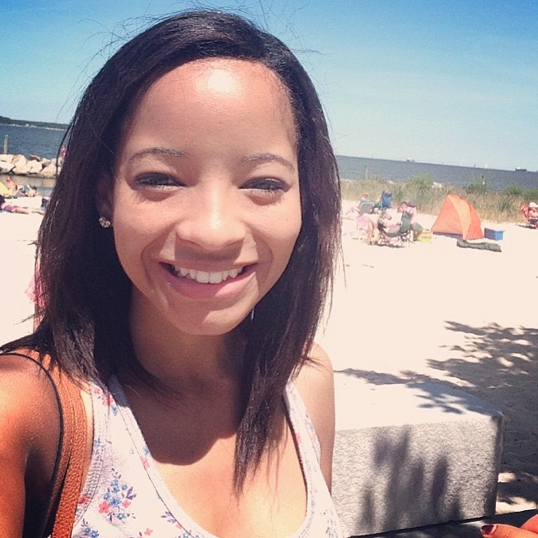
 Through the Department of Modern Languages and Literatures, I’ve taken courses in French, Spanish, and German over my four years here. While my major studies in French have enabled me to express myself fully in another language and to understand the intricacies of francophone cultures, they’ve also encouraged me to investigate more closely the wide array of human experiences found in francophone literature, and how aspects of French history still affect the francophone world today. In my future studies in television and visual media, I hope to further explore how these types of stories are being told in our own society today.
Through the Department of Modern Languages and Literatures, I’ve taken courses in French, Spanish, and German over my four years here. While my major studies in French have enabled me to express myself fully in another language and to understand the intricacies of francophone cultures, they’ve also encouraged me to investigate more closely the wide array of human experiences found in francophone literature, and how aspects of French history still affect the francophone world today. In my future studies in television and visual media, I hope to further explore how these types of stories are being told in our own society today.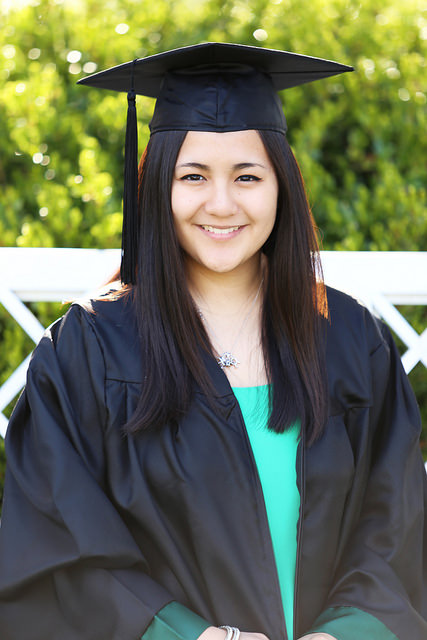
 In learning another language, you also learn another culture; French is spoken natively on nearly every continent, so in studying French, I learned about another world and how so many cultures were shaped. To experience it firsthand, I studied abroad in France, twice.
In learning another language, you also learn another culture; French is spoken natively on nearly every continent, so in studying French, I learned about another world and how so many cultures were shaped. To experience it firsthand, I studied abroad in France, twice.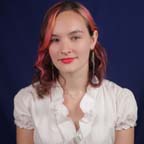
 Studying Chinese in the W&M MLL department gave me confidence. My teachers prepared me well for studying and living abroad in China, and my semester of immersion study in Beijing proved it. Within my first week there, I could navigate the subway, ask for directions when lost, and avoid social faux pas among my Chinese friends. The vocabulary, work ethic, study techniques, and cultural information that my Chinese teachers provided me with allowed me to hit the ground running on my first extended stay in China. Knowing that I have gained the skills to be successful in a city on the other side of the world has made me feel like I can do truly anything. When I return there to teach English this fall, I will again be grateful to my Chinese teachers whose praise and reproach remind me that I should be proud of my ability to speak Chinese and make use of it, but that there is always room for improvement.
Studying Chinese in the W&M MLL department gave me confidence. My teachers prepared me well for studying and living abroad in China, and my semester of immersion study in Beijing proved it. Within my first week there, I could navigate the subway, ask for directions when lost, and avoid social faux pas among my Chinese friends. The vocabulary, work ethic, study techniques, and cultural information that my Chinese teachers provided me with allowed me to hit the ground running on my first extended stay in China. Knowing that I have gained the skills to be successful in a city on the other side of the world has made me feel like I can do truly anything. When I return there to teach English this fall, I will again be grateful to my Chinese teachers whose praise and reproach remind me that I should be proud of my ability to speak Chinese and make use of it, but that there is always room for improvement.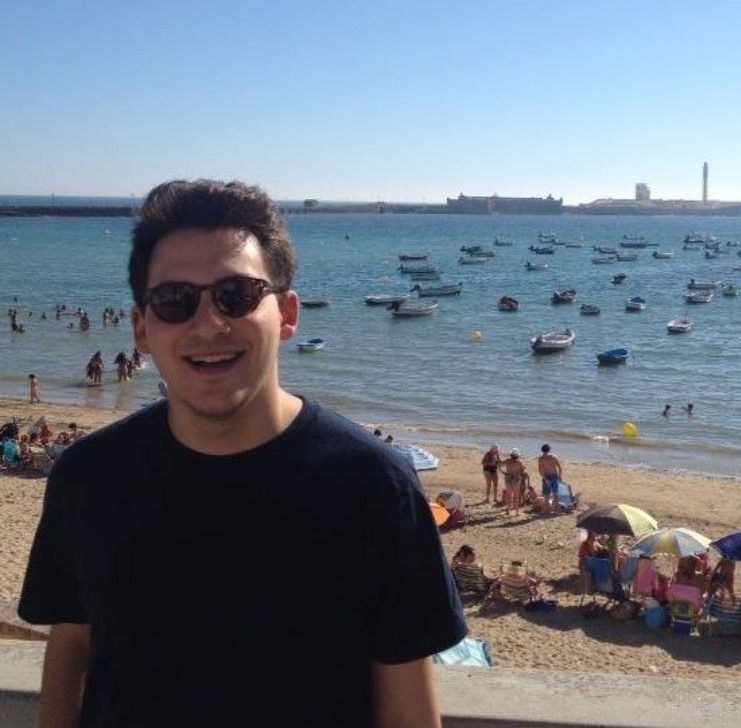
 As a pre-medical student at the College with an awareness of the changing landscape of healthcare in the United States and the need for inter-cultural competence, I began taking Hispanic Studies courses. With a passion for helping the underserved, Hispanic Studies allowed me to understand the challenges that many populations face and provided me with fluency in the language to do research and service abroad.
As a pre-medical student at the College with an awareness of the changing landscape of healthcare in the United States and the need for inter-cultural competence, I began taking Hispanic Studies courses. With a passion for helping the underserved, Hispanic Studies allowed me to understand the challenges that many populations face and provided me with fluency in the language to do research and service abroad.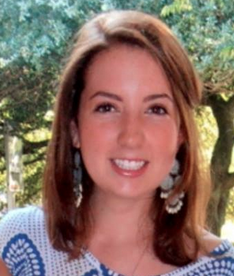
 My studies in the Modern Languages and Literature department encouraged me to constantly look outside of my own perspective and point of view to see my world and the world as a whole in a more well-rounded way. Studying French, I was encouraged to have an open mind, to question norms, and to appreciate the traditions of other cultures. While my study in the department may have come to an end, I know I will carry this mindset with me throughout my life—continuously analyzing and questioning the culture I live in, my own beliefs, and seeking out new perspectives and mindsets in the process. I have a drive to learn more about those vastly different from myself, and I have become used to being outside of my comfort zone. By challenging myself and the world around me, I will be able to have vastly different experiences in my life that would not have been possible without the critical thinking I learned in this department.
My studies in the Modern Languages and Literature department encouraged me to constantly look outside of my own perspective and point of view to see my world and the world as a whole in a more well-rounded way. Studying French, I was encouraged to have an open mind, to question norms, and to appreciate the traditions of other cultures. While my study in the department may have come to an end, I know I will carry this mindset with me throughout my life—continuously analyzing and questioning the culture I live in, my own beliefs, and seeking out new perspectives and mindsets in the process. I have a drive to learn more about those vastly different from myself, and I have become used to being outside of my comfort zone. By challenging myself and the world around me, I will be able to have vastly different experiences in my life that would not have been possible without the critical thinking I learned in this department.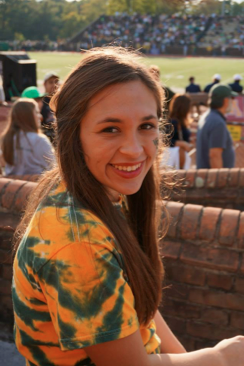

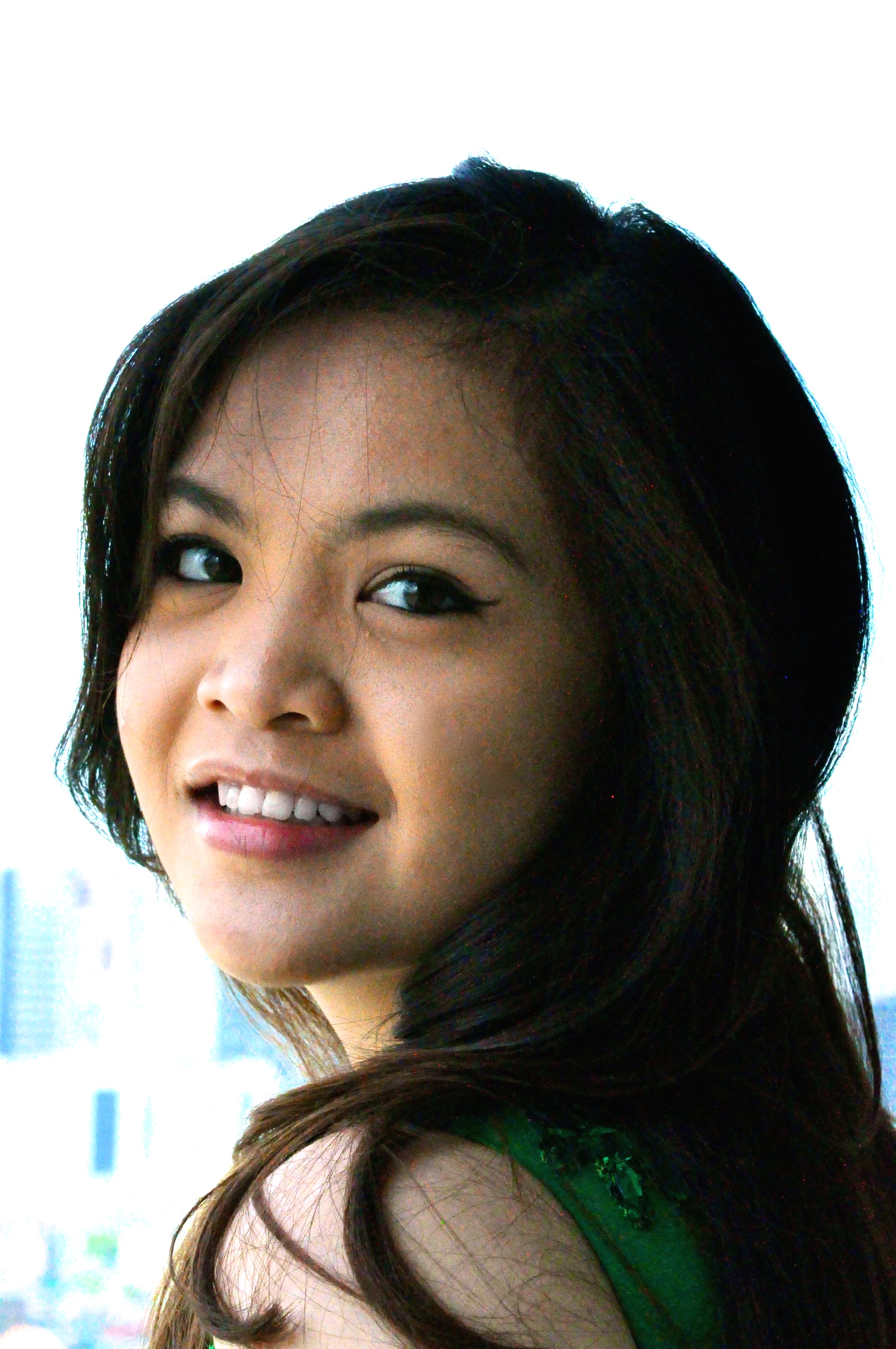
 Studying MLL has enhanced my education, broadened my worldview, and influenced my life in countless ways. Having studied French for 16 years, there was no doubt that I would major in French and Francophone Studies; however, it was not until I took classes in college that I began to see the benefits my studies would have. Learning a foreign language is always an asset, but my studies in MLL has also allowed me to read great literatures, think critically about these texts, and form my own beliefs regarding the world issues we address. The work I have accomplished in my French classes has also aided in my performance in classes outside of the MLL department, in that I can analyze literatures with ease and express myself well through my own writing. MLL has exposed me to issues and has taught me techniques I would have never known had I not studied French, and my career at the College would not be complete without my studies in MLL.
Studying MLL has enhanced my education, broadened my worldview, and influenced my life in countless ways. Having studied French for 16 years, there was no doubt that I would major in French and Francophone Studies; however, it was not until I took classes in college that I began to see the benefits my studies would have. Learning a foreign language is always an asset, but my studies in MLL has also allowed me to read great literatures, think critically about these texts, and form my own beliefs regarding the world issues we address. The work I have accomplished in my French classes has also aided in my performance in classes outside of the MLL department, in that I can analyze literatures with ease and express myself well through my own writing. MLL has exposed me to issues and has taught me techniques I would have never known had I not studied French, and my career at the College would not be complete without my studies in MLL.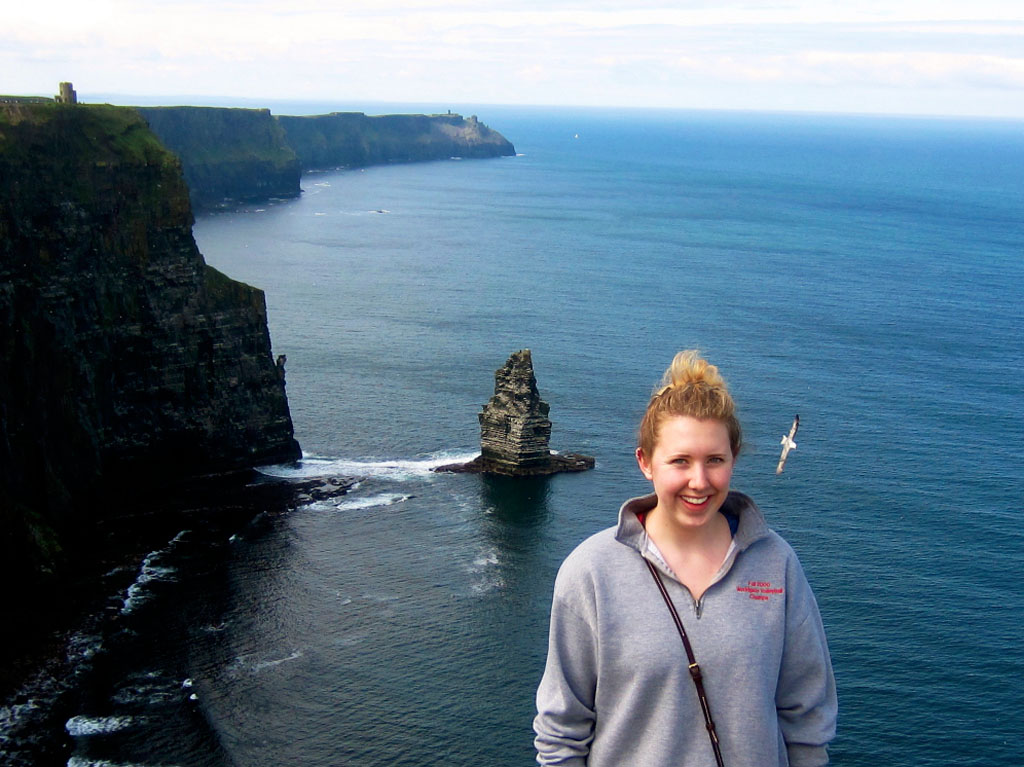
 Most importantly, my studies in MLL have given me so many more excuses to travel. In actuality though, the world is full of different languages and by taking the time to learn a few, there are countless benefits to be had. I feel that I’m more open-minded and accepting of differences in people because I’ve had the opportunity to learn about different cultures as a result of learning and practicing different languages. It’s not just about memorizing grammar rules and vocab, but more so discovering new perspectives and ideas and appreciating the differences in lifestyles and values. My studies in MLL have made me a more confident and realistic individual because I understand that perfection is not the most crucial aspect in life and I’m more likely to take chances as a result.
Most importantly, my studies in MLL have given me so many more excuses to travel. In actuality though, the world is full of different languages and by taking the time to learn a few, there are countless benefits to be had. I feel that I’m more open-minded and accepting of differences in people because I’ve had the opportunity to learn about different cultures as a result of learning and practicing different languages. It’s not just about memorizing grammar rules and vocab, but more so discovering new perspectives and ideas and appreciating the differences in lifestyles and values. My studies in MLL have made me a more confident and realistic individual because I understand that perfection is not the most crucial aspect in life and I’m more likely to take chances as a result.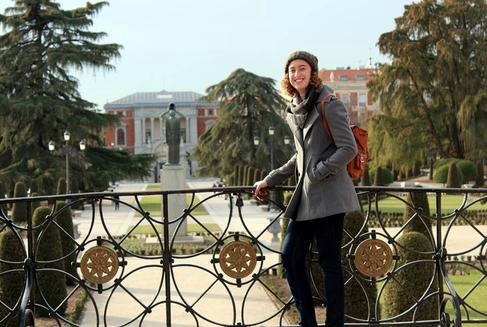

 When I initially started taking Hispanic Studies classes my freshman year, it was with the simple goal of maintaining the language skills that I had worked on during high school. I had no idea I was entering a department that would challenge me to change the way I think, and would succeed at it. This department brilliantly combines the study of Spanish language with that of the history and culture of the Spanish-speaking world to discuss greater themes that are significant to all. I am endlessly grateful to Hispanic Studies for exposing me to different issues and giving me the skills to continue to see new ones. This program inspired me to spend a semester in Sevilla, Spain, spend seven weeks in Jinotega, Nicaragua, and directly enabled me to have internship experiences at the Library of Congress and the Embassy of Spain. I have loved both of my majors at the College, but Hispanic Studies is unparalleled in its capacity to nurture while opening minds.
When I initially started taking Hispanic Studies classes my freshman year, it was with the simple goal of maintaining the language skills that I had worked on during high school. I had no idea I was entering a department that would challenge me to change the way I think, and would succeed at it. This department brilliantly combines the study of Spanish language with that of the history and culture of the Spanish-speaking world to discuss greater themes that are significant to all. I am endlessly grateful to Hispanic Studies for exposing me to different issues and giving me the skills to continue to see new ones. This program inspired me to spend a semester in Sevilla, Spain, spend seven weeks in Jinotega, Nicaragua, and directly enabled me to have internship experiences at the Library of Congress and the Embassy of Spain. I have loved both of my majors at the College, but Hispanic Studies is unparalleled in its capacity to nurture while opening minds.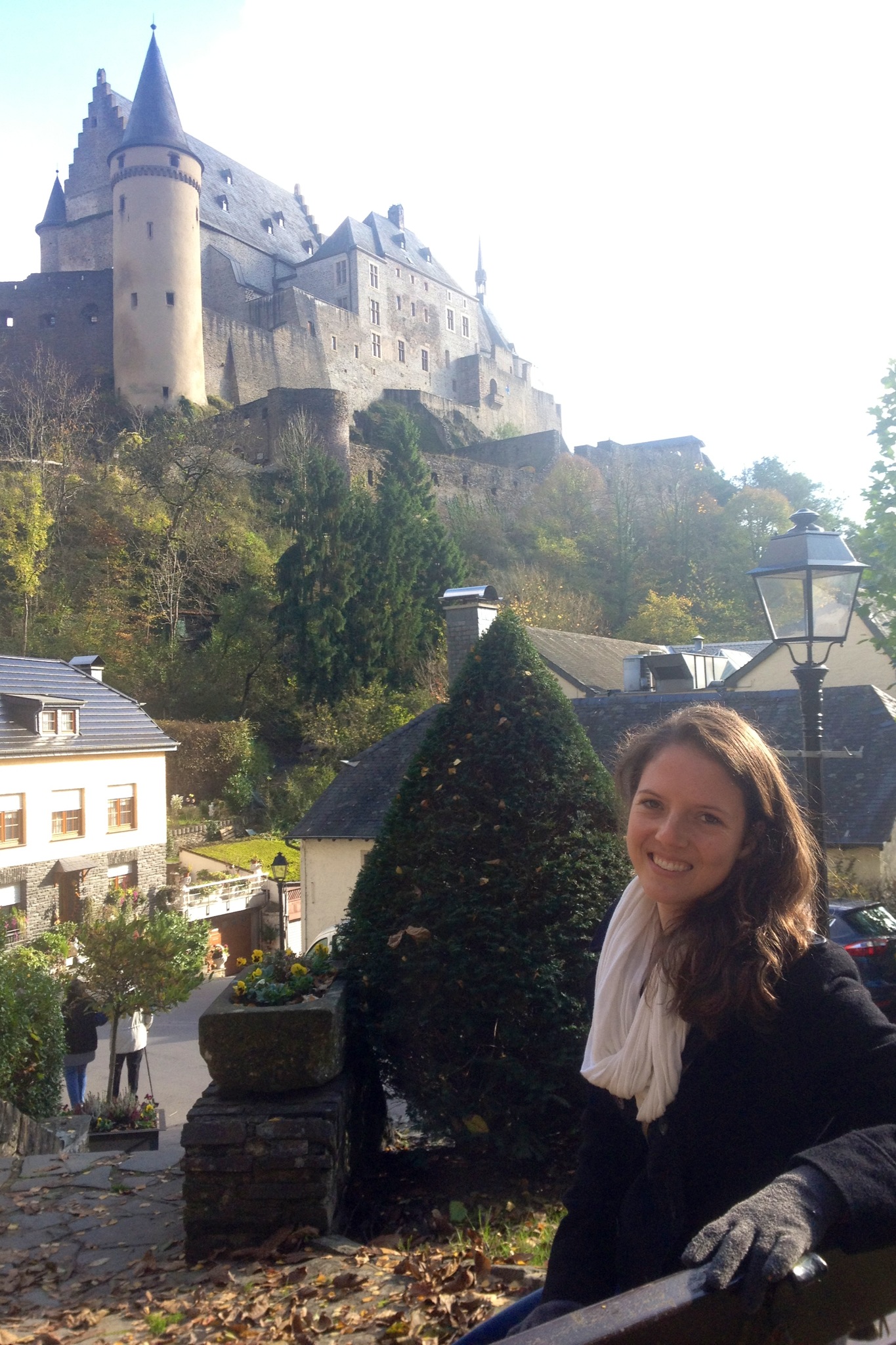
 Through the French & Francophone Studies major in the Modern Language Department, I was fortunate enough to have to opportunity to extend my studies to include a semester spent in Montpellier, France. This experience, coupled with courses at WM on the culture, history and literature of the francophone world, has served to expand my worldview and enhance my ability to understand novel perspectives. As a student of francophone studies, I’ve become better equipped to think critically and analyze the impacts of cultural context on individual action and expression. My studies have made me more intellectually engaged in the roots of systemic problems that continue to plague our society today—racism, sexism, oppression, ethnocentrism—and their role in a more global context. My courses in the modern languages department have allowed me to improve my ability to both write and think analytically.
Through the French & Francophone Studies major in the Modern Language Department, I was fortunate enough to have to opportunity to extend my studies to include a semester spent in Montpellier, France. This experience, coupled with courses at WM on the culture, history and literature of the francophone world, has served to expand my worldview and enhance my ability to understand novel perspectives. As a student of francophone studies, I’ve become better equipped to think critically and analyze the impacts of cultural context on individual action and expression. My studies have made me more intellectually engaged in the roots of systemic problems that continue to plague our society today—racism, sexism, oppression, ethnocentrism—and their role in a more global context. My courses in the modern languages department have allowed me to improve my ability to both write and think analytically.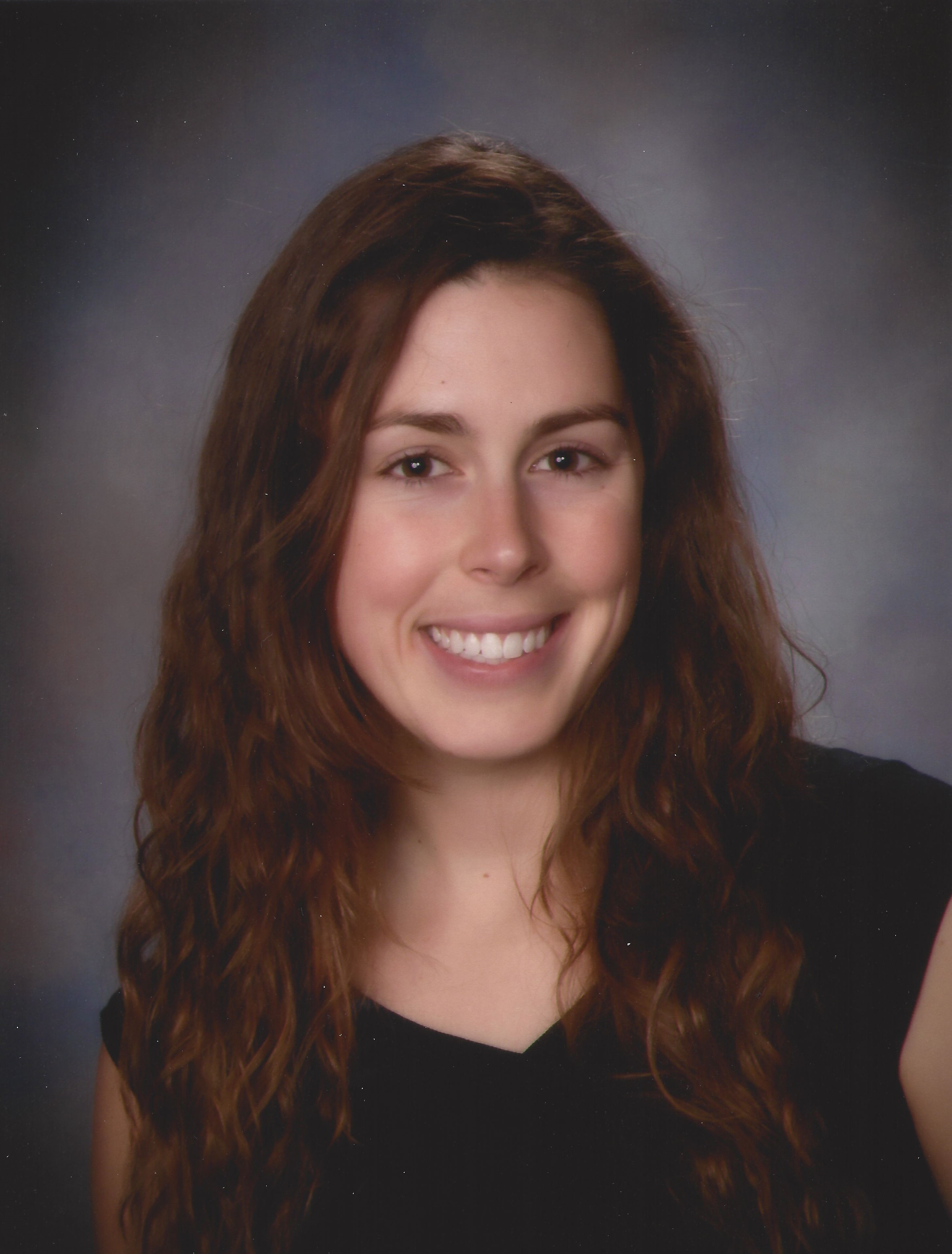
 My studies in MLL allowed me to study abroad and discover my interest in foreign languages and embrace new cultures. From my experiences and opportunities I have decided to live abroad and continue my studies in Modern Languages, as well as use my language skills in any future job I may have.
My studies in MLL allowed me to study abroad and discover my interest in foreign languages and embrace new cultures. From my experiences and opportunities I have decided to live abroad and continue my studies in Modern Languages, as well as use my language skills in any future job I may have.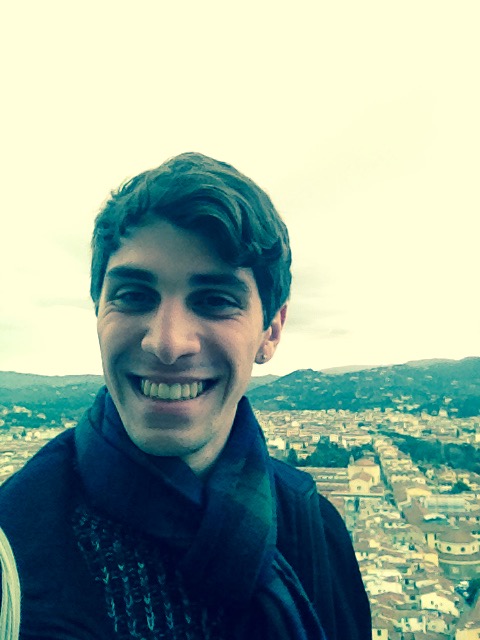
 My studies in MLL have given me a broader perspective on literature and culture in the world. I’ve had the opportunity to not only learn Italian, but to immerse myself in the culture and have become a better person because of it. My time both here and in Italy has been one of the most informative and amazing experiences in my life.
My studies in MLL have given me a broader perspective on literature and culture in the world. I’ve had the opportunity to not only learn Italian, but to immerse myself in the culture and have become a better person because of it. My time both here and in Italy has been one of the most informative and amazing experiences in my life.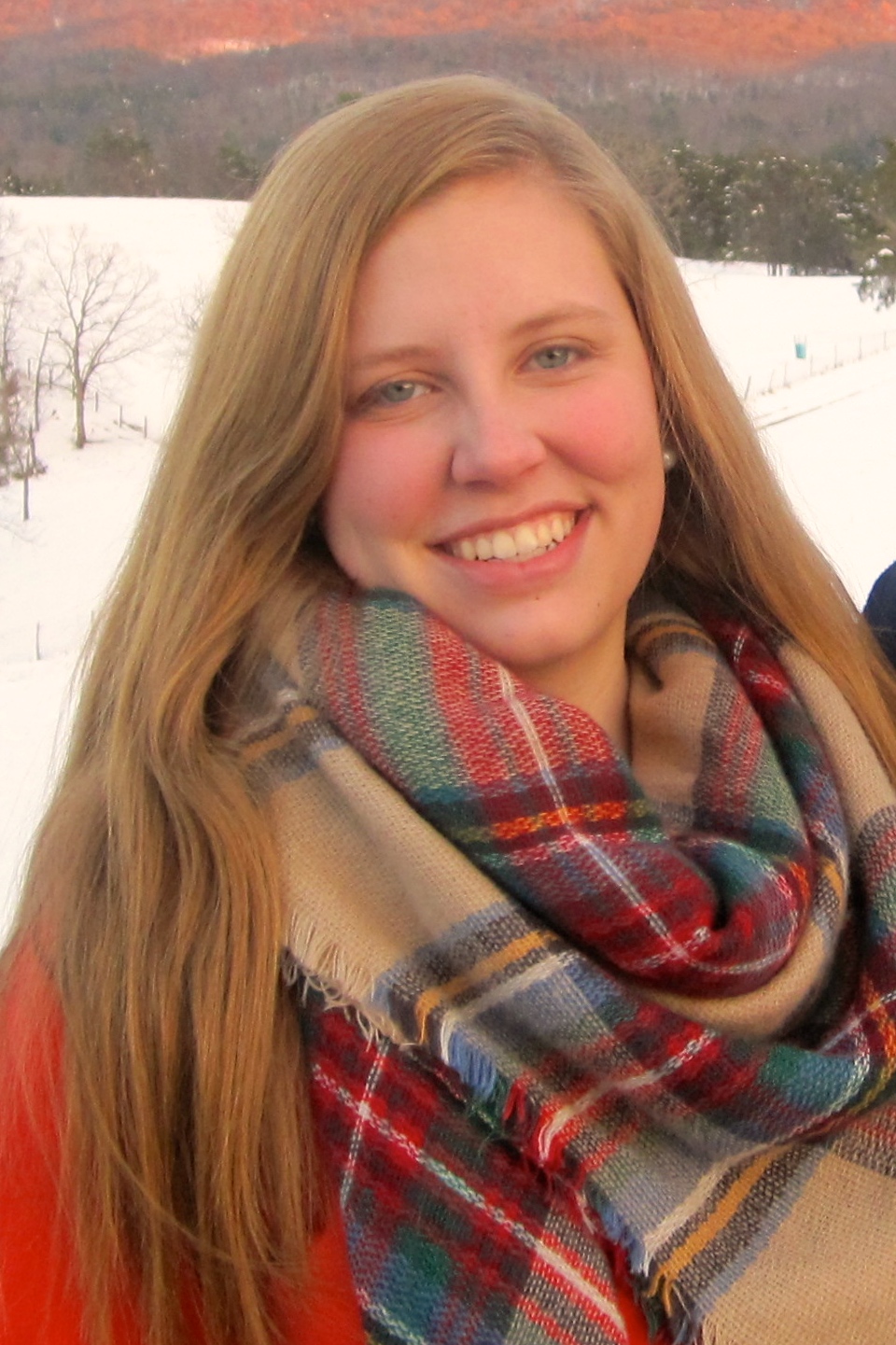
 I began taking Italian my freshman year to fulfill my language requirement and quickly realized that I loved the language, culture, and history of the country. I started to take any class that somehow related to Italy and decided to continue my studies through studying abroad. I spent the summer after my Junior year in Siena, Italy in a full-immersion program and had an amazing time. I learned so much and my time in Italy reiterated my desire to pursue a career where I could use my Italian and further my understanding of Italian culture. I feel that my experiences with the Italian department at William and Mary and my study abroad experience have made me a better, more informed global citizen and I feel fortunate to have had these opportunities. I am so thankful to Professoressa Boyle and Professoressa Seger who encouraged me to continue with Italian and have been so supportive and patient as I continue to learn.
I began taking Italian my freshman year to fulfill my language requirement and quickly realized that I loved the language, culture, and history of the country. I started to take any class that somehow related to Italy and decided to continue my studies through studying abroad. I spent the summer after my Junior year in Siena, Italy in a full-immersion program and had an amazing time. I learned so much and my time in Italy reiterated my desire to pursue a career where I could use my Italian and further my understanding of Italian culture. I feel that my experiences with the Italian department at William and Mary and my study abroad experience have made me a better, more informed global citizen and I feel fortunate to have had these opportunities. I am so thankful to Professoressa Boyle and Professoressa Seger who encouraged me to continue with Italian and have been so supportive and patient as I continue to learn. I’ve always had a knack and a love for learning languages, so the idea that I would study one throughout my three years here at the College was not one that surprised anyone. Yet I remain surprised by what Russian gave me in return for my loyalty to it. In particular, I learnt much about myself, my own capabilities, and what I am able to do, even when in a completely new environment. Before taking Russian, challenges were something I shied away from or gave up easily on. Now, after studying Russian, and studying abroad in St. Petersburg, I have a new perspective on facing them, which I can now bring with me to my future career. Without Russian, I would not have found the self-confidence and determination to face new challenges, fail, and start again, even when it seems too hard to do so.
I’ve always had a knack and a love for learning languages, so the idea that I would study one throughout my three years here at the College was not one that surprised anyone. Yet I remain surprised by what Russian gave me in return for my loyalty to it. In particular, I learnt much about myself, my own capabilities, and what I am able to do, even when in a completely new environment. Before taking Russian, challenges were something I shied away from or gave up easily on. Now, after studying Russian, and studying abroad in St. Petersburg, I have a new perspective on facing them, which I can now bring with me to my future career. Without Russian, I would not have found the self-confidence and determination to face new challenges, fail, and start again, even when it seems too hard to do so.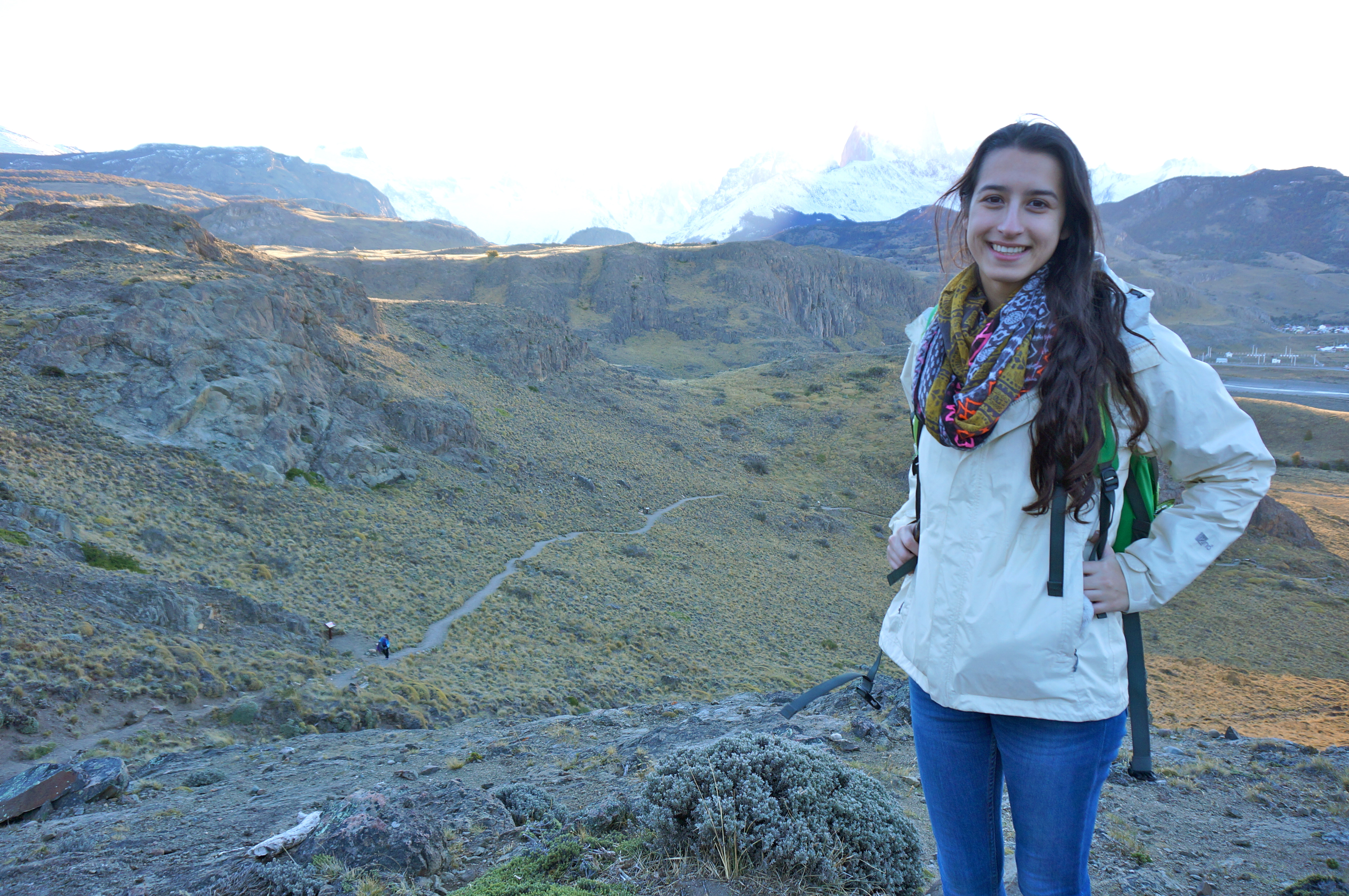
 My time and efforts spent majoring in Hispanic Studies have truly made my academic experience at William & Mary. As a freshman, I was interested in Latin America and wanted to continue my Spanish. I felt a bit lost that first semester, but I found solace in my tiny Hispanic Studies freshman seminar, where I felt the tight-nit bond that was missing in my giant Econ 101 lecture. From there, I took 281 with professors who I fondly remember as the “dream team” (Professor Tandeciarz, Rio, and Professor Longo) and I fell in love with the department and continued taking classes throughout my remaining semesters.
My time and efforts spent majoring in Hispanic Studies have truly made my academic experience at William & Mary. As a freshman, I was interested in Latin America and wanted to continue my Spanish. I felt a bit lost that first semester, but I found solace in my tiny Hispanic Studies freshman seminar, where I felt the tight-nit bond that was missing in my giant Econ 101 lecture. From there, I took 281 with professors who I fondly remember as the “dream team” (Professor Tandeciarz, Rio, and Professor Longo) and I fell in love with the department and continued taking classes throughout my remaining semesters.